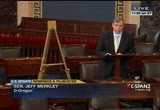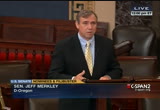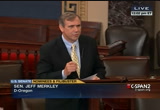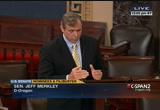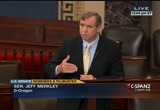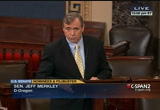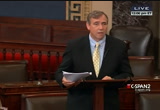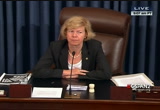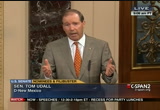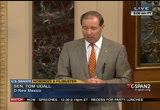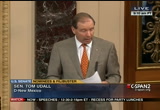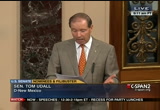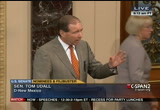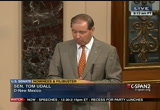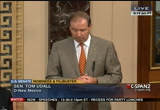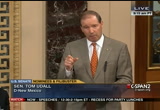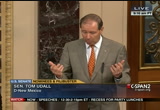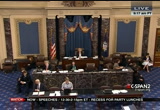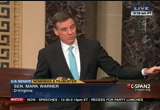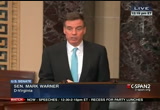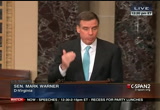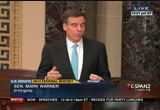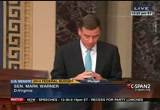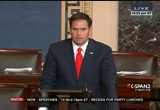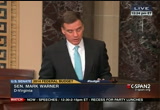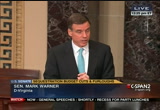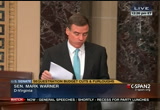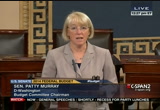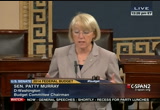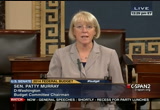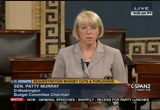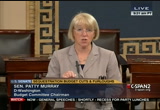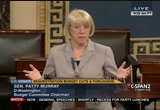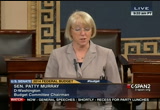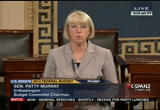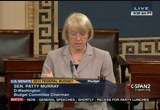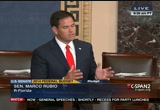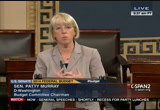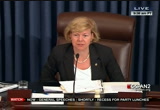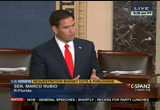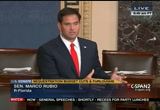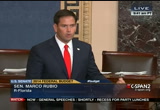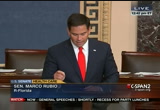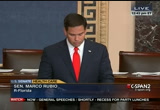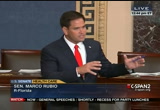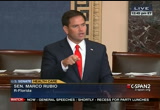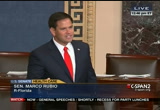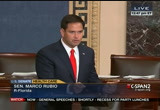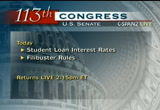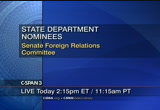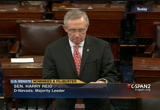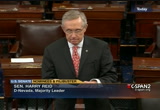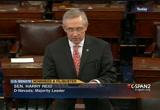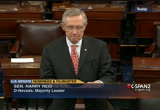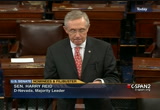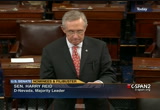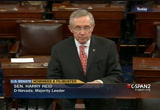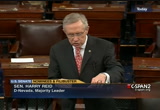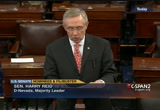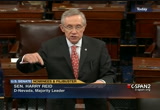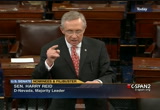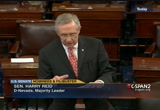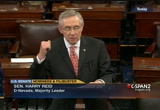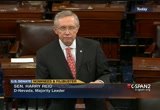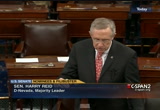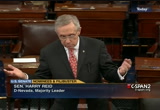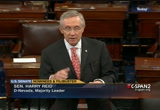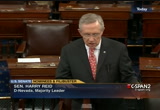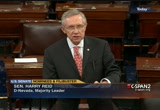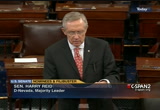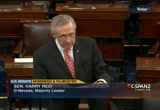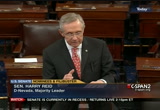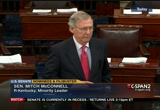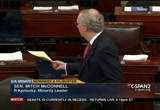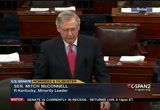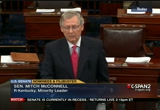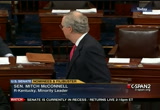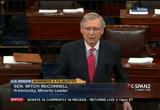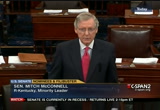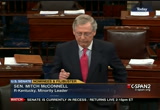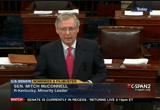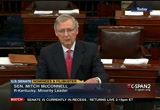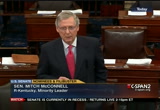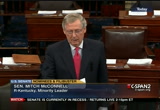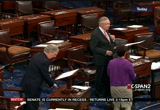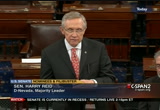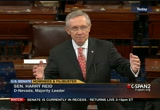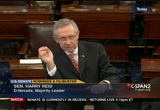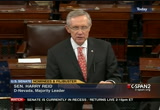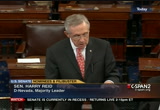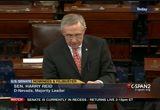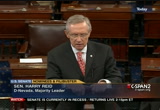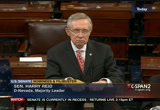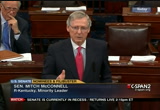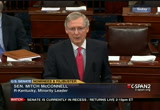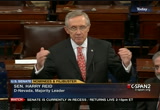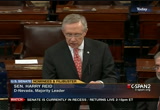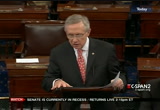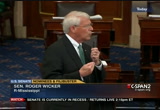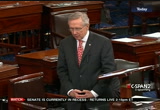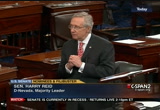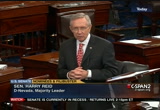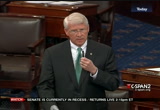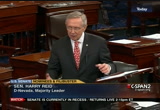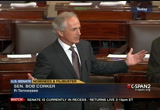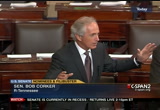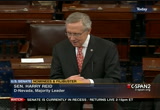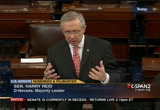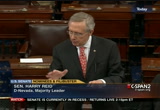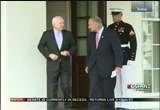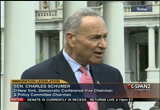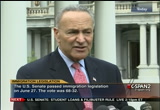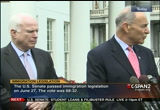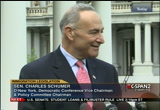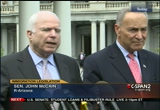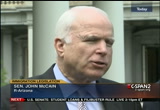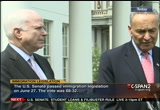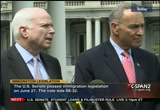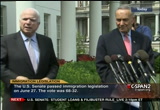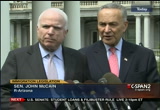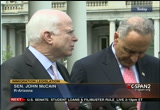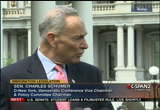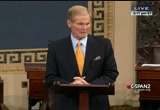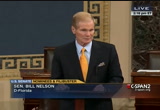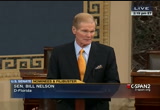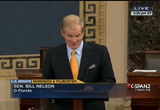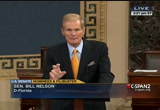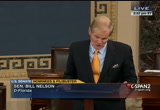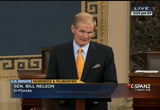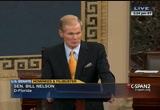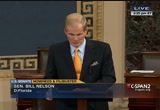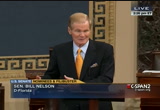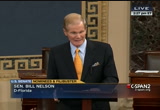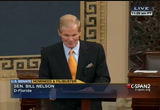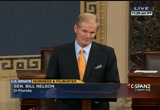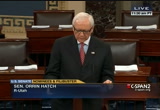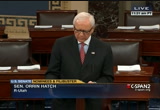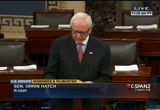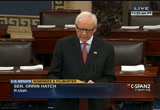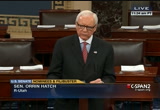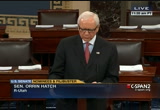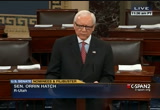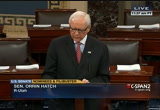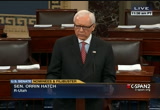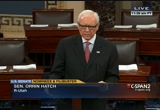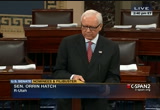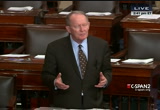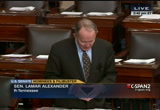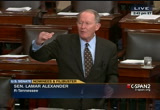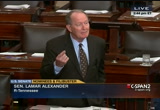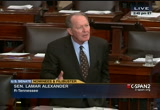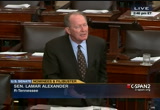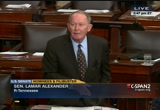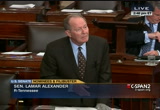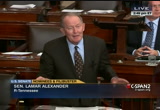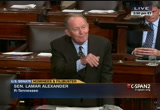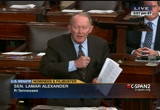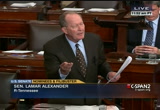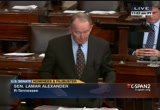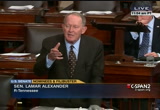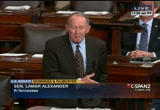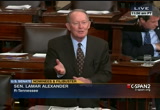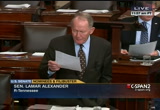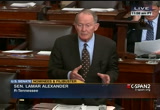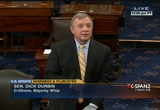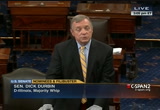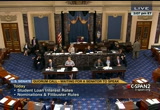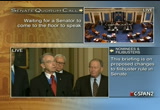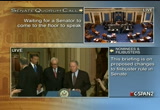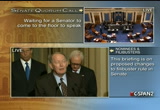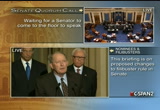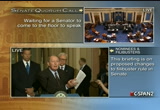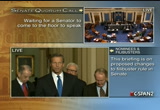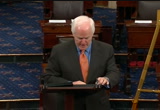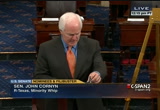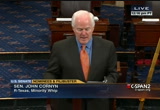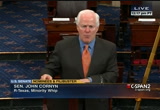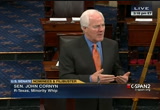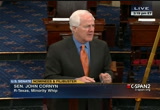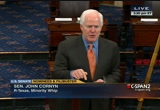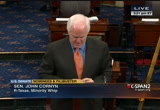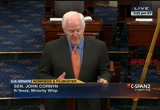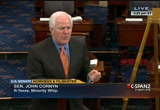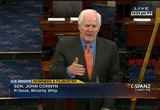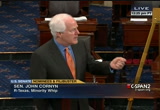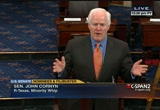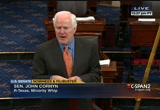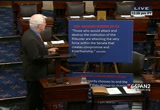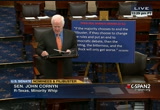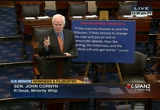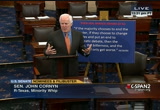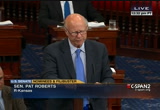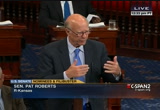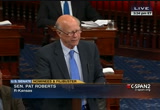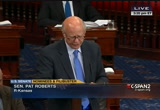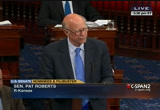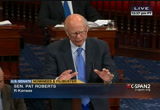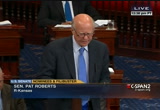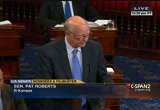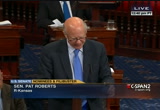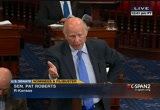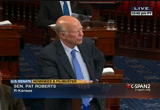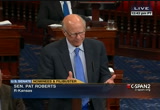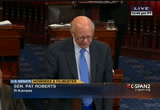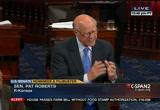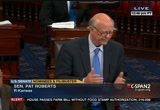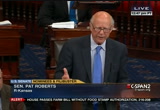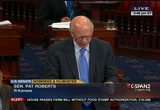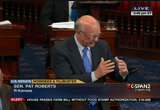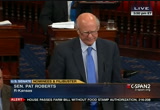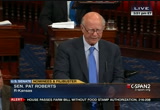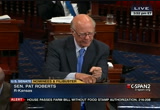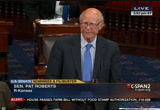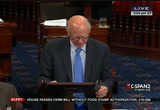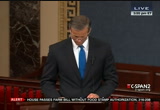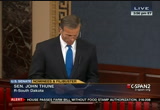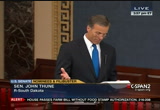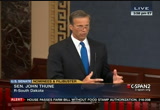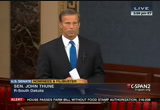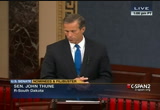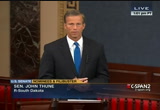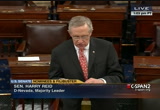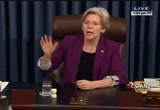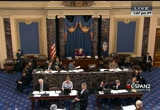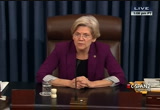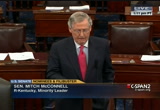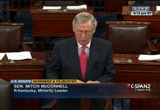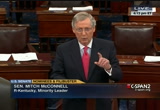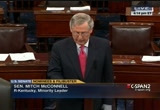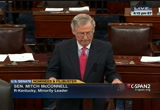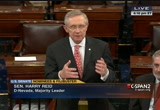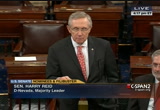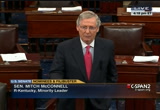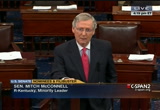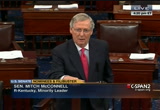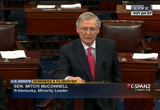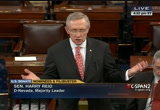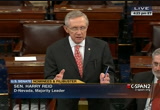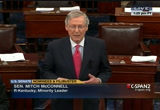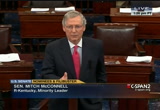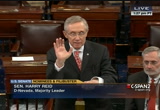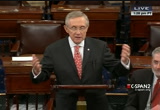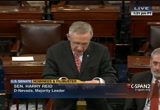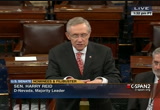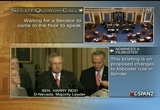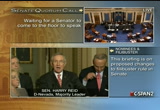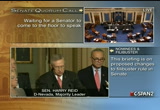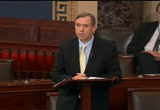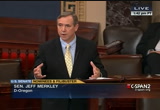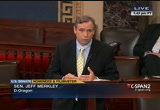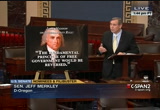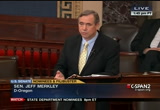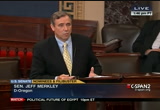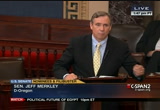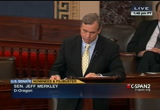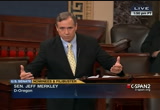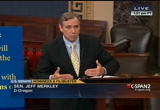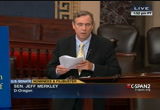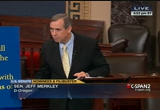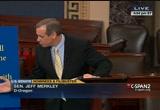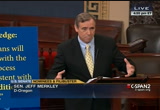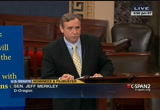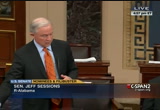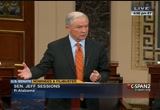tv U.S. Senate CSPAN July 11, 2013 12:00pm-5:01pm EDT
12:00 pm
relations board. in just a few weeks, in august, there will no longer be a quorum for the nlrb. that means for the first time in 78 years, there will be no referee in place between the rules for the conduct of employers and employees. now that referee makes sure illegal practices by workers don't occur and illegal practices by employers don't occur. we lose that referee in a few weeks, that as members of this senate chamber have expressed, is their goal. again, this is unprecedented. not putting forward a policy debate over eliminating the national labor relations board but instead undermining it by blocking the ability to hold up and down votes on the conferees. workers are deeply affected by whether or not this referee is in place.
12:01 pm
kathleen von itzen a panera baker who tried to organized her fellow bakers and she came and talked here in washington, d.c. about how they've been unable to get to a final contract, and how in the process their hours have been -- their members have been cut, in some cases their hours have been cut, a whole host of retaliatory measures. these are the things that you need a referee for to say that is not acceptable or to judge the evidence. that's why we need the nlrb. or how about marcus hedger who was fired for taking a friend through the shop floor, it just so happened marcus was a union leader in his shop, he asked permission to escort a friend through the floor, it was given and then the employer said aha, we got you, we can fire you because you know what, you're not allowed under the rules to
12:02 pm
escort a friend through the shop floor. the nlrb ruled quickly and said this was an extraordinary flimsy retext for firing someone because they happened to be a shop steward during a labor negotiation. the company was trying to send a message. they were trying to say if you support workers organizing to fight for living wages, you may get fired. and here we've just set an example. well, it's the nlrb that is the referee that says those sorts of unacceptable tactics will not occur. now, back to the consumer financial protection bureau. it's refunded americans $425 million by savings by getting rid of credit card tricks and traps. i think it's important that we fight for the success of our families. these are family values. we should not measure the success of our nation by the size of the gross domestic prungt. we should measure it by the success of our families. and eliminating predatory
12:03 pm
tactics is an incredibly important piece of that puzzle that touches millions. so what we've seen is this: the pledge placed on this floor by our republican leader in january, this pledge that said we would return to the norms and traditions of the u.s. senate for nominations has not occurred. republican leader may indeed have had every goodwill in laying out that pledge but it requires the cooperation of the entire caucus. that certainly has not occurred. and we haven't really heard a strong effort, if you will, to abide by that pledge from january. so it is time to restore the norms and traditions of the senate. where the senate provides a check on outrageous nominations but it is a check not a form of
12:04 pm
paralysis. it is advice and consent. it is not, if you will, paralyze or veto. so for those who love democracy, it has been sad to see this chamber once considered the premier deliberative body in the world fall into such a stage of paralysis and dysfunction. it's up to us as members of this body to come forward and say that is absolutely unacceptable. and that is the debate that was started today. i applaud the majority leader, who in january of 2011 strived to resolve this dysfunction through a gentleman's agreement and within week that gentlemen's agreement was in tatterrers -- tatters. i applaud the majority leader for his instinct in january where he sought modest
12:05 pm
bipartisan rule changes with a promise of comity and a promise from the republican leader to return to the traditions of the u.s. senate. his inn stingts was right. we should be able to restore these things by restoring the social contract. the leader harry reid has gone the extra mile and then the extra mile in seeking to adopt the social contract that held this body together. but now what we see is this: it has not been reciprocated. the pledges made, the promise of comity, the gentlemen's agreement not have resulted in material changes in the tactics employed on the floor of this senate. so now we have to work to restore the vision of our founders. the vision of a simple majority, timely up-and-down votes on nominations. we owe this to the executive branch, we certainly owe it to
12:06 pm
our citizens who reelected president obama. now, i want to address one last point. and that is that it has been argued that what the majority leader is proposing, that is, that if necessary change the rule or change the application of the rule in order to make this place work again, is unprecedented. the presiding officer: the senator's time has expired. mr. merkley: thank you. i ask unanimous consent for one minute. the presiding officer: without objection. mr. merkley: thank you. i have in my hand a document the senate's power to make procedural rules by majority vote. this lays out a whole host of viewpoints expressed in 2005 that i think would be interesting reading for my colleagues across the aisle because it was their document. i also have a long list of cases where every other year on average we have changed the application of a rule in order to make the senate function in a different way, a better way. so this is far from
12:07 pm
unprecedented. it is time for us together as u.s. senators to do our responsibility, and restore the power to the executive branch to put their folks in place operating our advise and consent in the way envisioned in the constitution. thank you, madam president. a senator: madam president? the presiding officer: the senator from new mexico. mr. udall: thank you, madam president. madam president, i have seven unanimous consent requests for committees to meet during today's session of the senate. they have the approval of the majority and the minority leaders. i ask unanimous consent that these requests be agreed to and that these requests be printed in the record. the presiding officer: without objection. mr. udall: thank you very much, madam president. madam president, i come today to speak about the rules issue that has come to a head here in the senate.
12:08 pm
we have seen the unprecedented obstruction by the other side of the aisle. they have continually, continually blocked the nominations and i'll get into the numbers here, but this is something that has been building since we came in in this congress, we had a debate about rules, we didn't do the things that we should have done, we should have put in place a talking filibuster. there's no doubt about it. we should have put in other rules changes. and now what has happened is we find ourselves in the situation of a tyranny of the minority, and what is a tyranny of the minority? the founders talked about it. the founders saw that if you created a situation where a minority could block the action of the senate, then the minority would actually be governing, and that's the
12:09 pm
situation we have before us here today. the minority governs when it comes to nominees, and they've blocked nominees in a very, very significant way, and this is -- i can't repeat enough, unprecedented, unprecedented in the history of the country. the president can't get his team. what is at issue here, really, we have a president of the united states who had a very big win in the last election, he put himself out there, he campaigned on a number of things, and won the election. so can you would think he can get his team in place. well, he's unable to get his team in place. he tries to propose people, for example, talking about the consumer protection agency, a very qualified attorney general, i was a former attorney general a few years
12:10 pm
back, and this -- this young man that he put forward from ohio, very well qualified. he has not been able to get a vote. and so he's in an agency that's tremendously important to the middle class, he's in an agency that's important to consumers, he's able to do things that are very, very important for consumers across this nation when it comes to bank loans, when it comes to safety issues. all across the board. and here now we have a situation where he cannot be sworn in and do his job as a full-time appointee for that agency. so this is -- it's absolutely unprecedented and we have to tackle this issue. the thing that's happening with the minority side here is if they don't like a nominee and they don't like the policies
12:11 pm
that the nominee stands for or they don't like the administration's policies, they prevent the nominee from taking office at all. and so in effect they, through the minority process that's being utilized here, are determining policy. and that's what the big objection is. and i think we're going to have to address this, and i'm very supportive of leader reid coming out saying we've got to address this, we've got to deal with this and i think we're going to deal with it starting today and flowing into the next week or so. it was mentioned here recently that the republican policy committee in the past has had a document, i believe it was put into the record, if it wasn't put into the record, i would move that this document -- can i ask the chair, was the executional option, the
12:12 pm
senate's power to make procedural rules by majority vote, was that put in the record? the presiding officer: without objection, it will be placed in the record. mr. udall: it will be placed in the record. thank you very much. it was mentioned in earlier debate. i just wanted to make sure that that was in there. and the thing that in read -- clear in reading this document, at the time of april, 2005 and in that period, they were making very, very strong arguments that you could go forward during the middle of a session and they were pointing out that majority leader robert byrd -- you know, robert byrd was one of the senators in this institution who really studied and knew the rules. most people believe that robert byrd knew the rules better than any senator in the last hundred years. and he always felt that you have
12:13 pm
the right under the constitutional option to make changes that needed to be made. and in 1977, 1979, 1980 and 1987, he established precedents that changed senate procedures during the middle of a congress. and i think that's what we're talking about here, is something along that line. so this is -- this is is a critical issue for us today as we try to move forward and we try to govern. the democrats have a majority and a big majority, if you take the independents that have joined with us, no doubt about it, yet we cannot govern because of the procedures that are being adopted here today. and i just wanted to highlight a little of the unprecedented republican obstruction. executive nominees who are ready to be confirmed by the senate
12:14 pm
have been pending on an average of 260 days, more than eight months since they were first nominated. the senate confirmed only 34 executive nominees by the july fourth recess compared to 118 at this point in the bush administration. there are 184 pending executive nominees. since president obama took office, senate republicans have filibustered 16 executive nominations, two nominees including mr. cordray, the consumer protection head, have been blocked via filibuster. for the first time ever, senate republicans filibustered a nomination for the secretary of defense. as "the new york times" noted -- and i'm quoting here -- "the vote represented the first time in history that the senate has required that a nominee for secretary of defense
12:15 pm
clear the 60-vote hurdle before a final simple majority vote." that's "the new york times." senate republicans continue to block the nomination of gina mccarthy to be e.p.a. administrator claiming she has been unresponsive. ms. mccarthy was forced to answer more questions than ever before, more than 1,100 questions since senate republicans boycotted her hearing at the committee i serve on, the environment and public works committee. ms. mccarthy was previous environmental advisor to mitt romney. she has very good credentials. i would urge my colleagues to look at what she did in new mexico. here you have gina mccarthy, there is a potential for a lawsuit, it's an issue that has to do with air quality in new mexico. she ended up pulling all the parties together through her regional administrator, and
12:16 pm
reached a compromise where we close down two coal-fired plants and opened up in their place two natural gas-fired plants. it was considered by the governor and the e.p.a. regional administrator and everybody, this was a win-win for everyone. she engineered that from her position at air quality there in the e.p.a. one of the other points that should be made about gina mccarthy, gina mccarthy is a woman who has already been approved by the senate. she has been approved in a lopsided vote. she has been doing her job for four years. so what are we doing here? that we're saying that she has to be filibustered, she has to be stopped because they don't like the policies she is going to be putting in place. so it's absolutely outrageous what's happening here, and we need to rein this in, and i agree that senator reid is
12:17 pm
headed in the right direction to do this. i notice that my colleague, senator patty murray, and leader senator patty murray and our leadership team is here. i would ask that any additional comments that i put -- that i have be put by consent into the record and would applaud her for her work with senator reid, with the leadership team in terms of trying to address how we govern, and i thank you, senator murray, for your good work on that and very much appreciate how you have tried to shape this issue and you have tried to always work with the republicans on this issue. we have tried to work through these things. we haven't been able to, and so i would yield the floor. the presiding officer: who yields time?
12:18 pm
mr. warner: madam president? the presiding officer: the senator from virginia. mr. warner: madam president, i appreciate the comments of my colleague from new mexico, and clearly as a former chief executive myself, it is remarkable to me that regardless of who the president of the united states, he or she ought to be able to get their team and ought to be able to get their team in place in a way that -- with appropriate oversight and review, but unfortunately it doesn't seem to be the case in this body at this point. but, madam president, i rise today to make some remarks on an issue that in my four-plus years that i have been here i think, while many of the other debates that we have are important, in my mind at least supersedes everything else, and quite honestly that if we could reach some resolution on, i think
12:19 pm
might go further than any other action in both lowering some of the rhetoric and lancing some of the boil of partisanship in this senate as well as quite honestly doing more for the kind of job growth that is still so desperately needed. and that, madam president, is getting our fiscal house in order, getting our balance sheet in order. we have seen some good news with an economy that recovers. we have seen our annual deficit numbers go down, although i have to be somewhat -- look with somewhat jaundiced eyes when the press is saying hallelujah, this year our deficit may be only $746 billion. that still is not -- is not good enough. and the solution set that we're looking for is not that far away. so in a moment, i'm going to make a couple comments and then ask my colleague, the medicare of our budget committee, to once
12:20 pm
again make an offer to proceed with regular order, something that has been the back stop of this debate about rules, something that our colleagues on the other side of the aisle, perhaps appropriately, beat us over the head for three years on about the fact that we ought to have a regular order around the budget. well, it's now been 110 days since the united states senate approved a budget. after a marathon session that went until 5:00 in the morning, a session that i think even our colleagues on the other side who didn't vote for the budget would agree was open and appropriate to rules and everybody got their chance to have their say and offer their ideas. and now for the 16th time, we're going to come and ask our colleagues to -- let's abide by
12:21 pm
regular order and go to a budget conference. let's do the hard work that's necessary to make sure that we finish the job of getting the kind of deficit reduction, getting our balance sheet in order that will allow this economy to move forward, and quite honestly allow us to get back to regular order on issues such as appropriation bills and a host of other things that quite honestly i can't speak for everyone, but people in virginia, i imagine people in washington state and i see colleagues from new mexico, florida, everywhere else saying what in the heck are you guys doing? why can't you get something done? and every day that we remain in this paralyzed state, while it may be great late-night fodder for comedians about congress' inability to act, at some point this dysfunction erodes the underlying confidence that the american people have in our institutions. and that is not good for american democracy and it's not good as well for the ability for
12:22 pm
the economy to recover. now, i want to make, again, a couple more comments and then ask the senator from -- chairman, the senator from washington, to make one more appeal to our colleagues on the other side to let the regular order work. but one of the things that we have seen a lot of press reports and kind of what is starting to seep into consciousness rg that the actions that were set up in sequestration, they don't seem to be as bad as what people thought. let's remind ourselves that sequestration was set up to be the stupidest option possible, an option so stupid that no rational group of people would ever let it come to pass, because any of us who have cut budgets -- and i have cut budgets as governor, i have cut budgets in business. there is a smart way and a stupid way to cut a budget. we set up a process that was so stupid that no rational group would ever let it happen. well, one of the reasons why i
12:23 pm
% is we didn't comerating hovers together, we didn't let this budget process take place, and we allowed this sequestration to move forward. the presiding officer: the time for the majority has expired. mr. warner: i ask unanimous consent for a five-minute extension, eight-minute extension. mrs. murray: i would ask unanimous consent for the senator from virginia to finish his statement and for me to have eight minutes in morning business and then allow our colleagues on the other side to respond. the presiding officer: is there objection? a senator: mr. president? the presiding officer: the senator from florida. mr. rubio: i don't have an option to the time they want to use. my understanding is that we are -- what's the order? what's our posture after 12:30? the presiding officer: at 12:30, the senate will stand in recess, absent consent. mr. rubio: i would ask consent that we be allowed to -- after they are done with their
12:24 pm
remarks, i'd like ten minutes -- i may have an objection, probably will -- and would like to speak on that as well. i want to make sure we don't run out of time. if we could have consent on that. i don't intend to keep us in longer than we need to be, but i certainly want to be heard. the presiding officer: is there objection? without objection. the senator from virginia. mr. warner: i thank my colleague. i will shorten my comments to make sure we get on with this. i just want to point out the fact that we're now starting to see furloughs in the federal work force. let me acknowledge there is no state in our nation that is more ground zero that is getting hid hid -- hit harder than the commonwealth of virginia with sequestration. i would simply make the point that there are real people that are being hurt by this. we have talked about some of the numbers, whether it's in head start or n.i.h. grants. let me just say some of the things that i have heard in the last two weeks from virginians.
12:25 pm
pat hickman who works at the department of defense, lives here in northern virginia. she is quoted as saying i'm tired of hearing it's only one day, it's only 20%. well, pat has now started to decide whether she -- perhaps because of these 11 days of furloughs is going to have to start to curtail her contributions to her thrift savings plans. so her retirement will be in jeopardy. another employee, name didn't come forward, said as we know during the summertime if you have kids who are in school, they are in daycare. well, this federal employee is paying $2,000 a month for daycare. they are not getting any furlough exemption, any daycare exemption, any discount on their -- these expenses that are built into their family budget.
12:26 pm
how could they have planned a year out that they were going to get furloughed 11 weeks in a row? a real story, a real person. greg granville who works down at the shipyard in portsmouth says that furloughing for the next 12 weeks will hit their expenses hard. he has a wife that is currently going for treatment for olympic. the insurance company only pays half. he has to decide -- do you cut back on the wife's treatment or do you go into the heart of your savings? i've got letters here and comments from virginian after virginian, urging us, begging us to take off our democrat and republican hats and put the interests of our country and our countrymen first and foremost. so, madam president, i know we have got lots of differences on how we want to approach and bridge this gap, but gosh knows, we're never going to get to bridge the gap on our
12:27 pm
differences on the debt and deficit and the budget unless we can get to conference and try to work this out. with that, madam president, i yield the floor and in strong support of our budget chairman, thank you for the great work that you have done in getting us a budget. thank you for working that in a fair way where our republican colleagues got a chance to raise their objections, and i sure hope and pray that we'll get to that conference so we can get this issue resolved. mrs. murray: madam president? the presiding officer: the senator from washington. mrs. murray: madam president, let me thank the senator from virginia. there is no one in this body more passioned to help us do the work to get us to a balanced, bipartisan deal to put the budget deficit and the budget issues behind us and to get our country back on track than the senator from virginia. i know he wants to get to a conference committee as badly as i do. not to demand that we only have our position, but to work with others to find a bipartisan solution. as he so eloquently stated, it's been more than 100 days now since the senate did pass a budget, and we have tried now 15 times to take the next step to
12:28 pm
move to a bipartisan conference with the house, and every time we have asked, we have been blocked by a tea party republican with the support of the republican leadership. now, i understand that for some factions in the republican party, compromise is a dirty word. that may explain why they have offered up excuse after excuse for blocking the regular budget order that we are trying to work towards. they have refused to allow conference before we get to a so-called preconference framework. they have demanded that we put preconditions on what can be discussed or talked about in a bipartisan conference, to claiming that moving to a budget conference which leading republicans, by the way, called for just months ago was somehow not regular order. to most recently claiming that we need to look at a 30-year budget window before we look at the major problems we have got in front of us right now, when we can clearly can and must
12:29 pm
actually do both at the same time. so, madam president, i -- i know. i know there are significant differences between our party's values and our priorities. some of us, democrats and republicans, think this is a reason to come together and try to reach a bipartisan deal in a budget conference. it's been heartening to hear from senators mccain and collins and many other republicans who chatted with me about why they believe we need to have a former bipartisan negotiation and move on this. but unfortunately, there is a small group of nor'easter who would prefer to throw up their -- group of senators who would prefer to throw up their hands and stall when we reach a crisis because they think they can get a better deal. madam president, i was home in my state like most senators last week and i talked to a lot of americans who don't understand that kind of approach. they run their businesses and help their communities and support their families by compromising every single day. they can't afford to wait to reach agreements until the very last minute, because when that
12:30 pm
happens, they have to deal with the consequences. but, madam president, that is exactly what my republican colleagues are doing to thousands of my families in the state of washington. because republicans won't allow us to come to the table, the automatic cuts from sequestration are impacting everything, from children who depend on head start to our national security. and what's mor more they'll try to tell you that sequestration isn'tism pacting american families. as the senator from virginia just talked about i can tell you firsthand that the impacts are real and for thousands of families in my home state these become a rereality tomorrow, that's because furloughs for the defense department begin this week, equivalent to a 20,000 pay cut for 650,000 workers nationwide. baseness washington are being
12:31 pm
furloughed and the first day is tomorrow. instead of going to work, thousands of workers in my state will stay home. the 911 call center and the fire department will be understaffed. air fields are going to be shuttered except for emergencies. the military personnel office is closed. the substance abuse center is closed. and the army medical center is going to close clinics even the wound care clinic is going to be understaffed. i'm reminded of one worker i met at home a few weeks ago, will silba. will is a former marine. he's an amputee. he works now as a fire inspector and he told me that because of these furloughs, he's going to have to get a second job and he's going to struggle with his mortgage payments. so these furloughs are going to directly impact thousands of people and civilian employees, and the leaders at lewis mccord have made it very clear
12:32 pm
the furloughs are going to hurt our soldiers. they're going to limit their access to medical care, they're going to cut back on the family support programs and they're going to make it tougher to find a job when they finish their military careers. why? because our colleagues refuse to work together and to me, this is just unacceptable. and because some republicans would like to preserve the harmful cuts from sequestration despite these kinds of impacts, we've got a $91 billion gap between the house and the senate appropriations levels for next year. and if we don't resolve that gap, we're headed for another round of uncertainty and brinksmanship, another unnecessary burden on our economic recovery and the millions of americans who look for work every day. so some of my republican colleagues say they're fine with that. in fact, house republicans are reported right now to be busy working on a debt limit ransom note right now. and so far that ransom note sounds a lot like the ryan
12:33 pm
budget. as you all know, the budget we did pass here in the senate was very different. but that, madam president, is exactly why we have to resolve our differences, in a conference. that's where we come together, in a public fashion, and talk about our differences and work out agreements. now, i believe we have an opportunity, a window of opportunity over the next few weeks to do what americans across the country have asked us to do. compromise. and confront these problems before we head back home to our states for the work period in august. we don't have a lot of time, but i'm confident that if those of us who can see working together as a responsibility rather than a liability come to the table and get a fair bipartisan agreement. and, by the way, madam president, i was very discouraged to hear just this week from some tea party republicans, many of the same ones who are now blocking us going to conference, who are already talking now about shutting down the government in order to defund obamacare.
12:34 pm
not only do they want to push us to a crisis, but they want to do that in order to cut off health care coverage for 25 million people, and reopen that doughnut hole we know so much about, causing seniors to pay more for prescriptions and the list goes on. so, madam president, this is an absurd position. we should not be talking about shutting down the government and i really hope that responsible republicans reject this approach and work with us on real solutions, not more political fights. so my colleagues and i are going to continue urging the senate republican leadership to end their tea party-backed strategy of manufacturing crises and allow to us do the work we were sent here to do and go to a conference and i urge them to listen not just to democrats but to many members of their own party who want to get to a budget conference and allow us to get to work to solve the nation's problems. so today i come to the floor to
12:35 pm
ask unanimous consent that the senate proceed to the consideration of calendar number 33, h. con. res. 25, that the amendment which is at the desk, the text of s. con. res. 8, the budget resolution passed by the senate be inserted in lieu thereof, that s. con. res. 8 as amended be agreed to, the motion to reconsider made and laid on the table, that the senate insist on its amendment, request a conference with the house on the disagreeing votes of the two houses, and the chair be authorized to appoint conferees on the part of the senate. that following the authorization, two motions to instruct conferees be in order from each side, the motion to instruct relative to the debt limit and a motion to instruct relative to taxes and revenue. there be two hours of debate equally divided between the two leaders or their designees prior to the votes in relation to the motions and that no amendments be in order to either of the motions prior to the votes, all of the above occurring with no
12:36 pm
intervening action or debate and i ask that unanimous consent today. the presiding officer: is there objection? mr. rubio: madam president? the presiding officer: the senator from florida. mr. rubio: thank you, madam president. reserving the right to object, i do not oppose going to a budget conference with the house. and i think i have shown especially in the last week a willingness and ability to compromise on important issues like one that was quite franc very unpopular among people supportive of my candidacy and my time here in the senate when we dealt with the issue of immigration. my concern is when this goes to a budget conference with the house they believe negotiate a debt limit, an issue so monumental it should be debated on its own merits by itself. what i am proposing is a compromise. let's go to conference but let's assure everyone here that this is not a conference that's going to deal with the debt limit. we need to deal with that issue separately. so i would ask unanimous consent from the senator if she would modify her request on a compromise. let's compromise on this. i ask unanimous consent that the
12:37 pm
senator modify her request so it not be in order to consider a conference report that includes reconciliation instructions to raise the debt limit. mrs. murray: madam president? the presiding officer:s to company does the senator so modify her request? mrs. murray: i will object but let me say this, what the senator is requesting, we tell the conferees before they ever get to the senate conference free what they're going to do on a specific issue. what i offered in my original offer is to have a vote on that which is how we do this here. the senator is requesting not that we have a vote but that we have a demand. now, i respect the senator from florida, he has worked very hard as he stated on immigration reform, he is working now to try and get the house to pass that, at some point they will go to conference. what he is saying is when his bill goes to conference, what he wants to do is to allow any senator on this floor, make a demand of that conference
12:38 pm
committee before they get there, not a vote, a majority vote but a demand from a small minority of what's going to be in that conference. we cannot agree on that. what i've offered is a vote on that. we are a democracy. you're allowed to vote and if enough senators agree that is what we would direct the conference to do. this body is not built on a demand from one senator or a group of senators on a conference before we go there. we are a democracy. i again would object to his request, as he said, and renew my request which will allow a debate and a vote on that issue that he is requesting as happens in a democracy. the presiding officer: objection is heard to the modification. is there objection to the original request? mr. rubio: i object. the presiding officer: objection is heard. mr. rubio: madam president? the presiding officer: the senator from florida. mr. rubio: how much time do i have remaining? the presiding officer: ten minutes. mr. rubio: thank you, madam president.
12:39 pm
let me say on the outset on this debt limit issue we've been told by everyone here the debt limit is not going to be dealt with, they don't intend to deal with, we have rules that prohibit that from happening. if the intent is to say we're not going to deal with the debt limit, why not put it in writing? it raises suspicion they refuse to take the debt limit off the table in writing in a specific motion even though they've told us that's not the case. but i want to raise a couple of points in regard to this debate we're having. we've heard a lot about the impact of the sequester on our country and i don't dispute that will have an impact. in fact, i voted against the deal that gave us the sequester. and i voted against it because i don't -- i believe deeply we need to constrain spending, we're spending a lot more than we're taking in, about a trillion dollars more than what we're taking teag in, borrowing about 40 cents of every dollar we spend in the federal government and for the folks in the gallery you may be 140bgd to hear that. every dollar the federal government spends, 40 cents is borrowed. when you borrow, you have to
12:40 pm
pay it back with interest. that's your money, doesn't come from a tree, that taxpayers eventually have to come up with and for the younger folks i want you to understand it's primarily going to come from you in the years to come. and so the reason i thought the sequester was a bad idea because that sequester is going after things that by and large are not the drivers of our debt. the drivers of our debt are certain programs that are built in a way that are unsustainable. important programs like medicare. i believe in medicare. i support medicare. as i tell anyone when they ask me about it, my mother is on medicare. i don't want to see medicare hurt or changed for her. but i recognize if medicare is going to exist when i retire, we better start making some changes it to for future retirees. people 20 or 30 years from now. that's what we should be focusing our reform efforts and we can't get the other side to drea tra on any changes. there was an nefort the house to do something serious about it and they brutally attacked it. there was a reference to the ryan budget a moment ago.
12:41 pm
the ryan above budget, i'm not g it was perfect but us that because the most serious effort to reform a program that's going bankrupt on its own. the only thing worse than the sequester is to raise taxes because that will hurt job creation in america. the only thing worse than the sequester is to have no spending reductions at all. the point saying we're not going to agree to a short-term budget unless obamacare is defunded and we're threatening a crisis by shutting down the government. let me say one of the people who said that is me. let me address that for a moment. let me tell you what the disaster is. the real disaster is obamacare itself. in fact, it is such a disaster that the people who supported it are now delaying implementing portions of it. just last week we were told that one of the key components of the law requiring that employers provide insurance, they're going to have to delay that by a year, conveniently until after the next election. here's the other thing we found out last week.
12:42 pm
because i know under obamacare when you go in and say i make so much money, you can qualify for the government to give you extra money to buy insurance. guess what, they've now admitted they have no way of verifying how much money you really make. basically means people get to show up and say i only make $20,000 a year and get their subsidy with no way to verify the truth about how much they make or not. but it's not limited to that. the disaster that is looming with regards to obamacare impacts every single american. here's a list of them that was recently produced by the heritage foundation. they have missed a bunch of deadlines. most states resisted obamacare's call to create insurance exchanges, choosing to let washington create a federally run exchange instead however a government accountability office noted critical activities have not been completed and the missed deadline suggests a potential for challenging going forward. that's right. you may have to go into a federal exchange including members of congress and their staff, the exchange doesn't exist yet.
12:43 pm
you're going to be expected in a couple of months to sign up for something that doesn't exist yet. that's one part of the disaster. there are many others. the administration announced in april workers will not be able to choose plans from gift insurers in the small business exchange next year. a delay that a liberal blogger called a really bad sign of obamacare incompetence. the child only plans, one of the things people were excited about. there was a drafting error that led to less access to children with preexisting conditions. a 20152011 report found in 17 states insurers are now no longer selling child-only plans. basic health care plan delayed. the government-run plans for states created as part of obamacare has been delayed prompting one democrat to criticize the administration for -- quote -- "failing to live up to the law and implemented as
12:44 pm
written." the early retiree reinsurance, it's broke. the $5 billion in funding for this program was intended to last until 2014 but the program run 0 ran out of money two years ahead of schedule. waivers. after the law passed, h.h.s. discovered that some of its new mandates would raise costs so much that employers would drop coverage rather than face skyrocketing premiums and so instead the administration announced a series of temporary waivers and guess what, more than half of the recipients of those waivers were members of a union health insurance plan. it goes on and on. this thing is a disaster. i don't care about how you feel about it. there is an insurance crisis in america. let there be no doubt. people are struggling to find access to quality health insurance. away we should deal with that but this approach is a disaster. no matter how you feel good about it, it's a disaster. it cannot be implemented in time. and you don't think that's
12:45 pm
looming over our economy? i just left a meeting right now with an owner of a chain of restaurants. they're worried about -- they don't know what to make of it yet. if you ask what's it going to look like next year, they don't know. we're in july already, folks. and we're going to implement this? we're going to force this on our economy? you don't think that's a disaster. you don't think in the real world, not in washington, not in the think tanks, you don't think in the real world, small and mid-sized businesses and individuals are holding back on moves? you don't think someone will say i will take my life savings and open up a business because it's my life's dream? you don't think that uncertainty is happening? it is. obamacare is keeping that from happening. that's the disaster. why would we fund a disaster? why would we pay for something out of the american taxpayers' wallet that we know isn't going
12:46 pm
to work? so when they talk about shutting down the government, it's going to be a disaster, obamacare threatens to shut down our economy. and so i'm telling you this is a disaster, and we should not fund, we should not have a temporary budget around here that gives money to this thing, because it's a disaster and it won't work, and it's going to hurt people. the other thing about this debt limit that i made such a big deal about, let me tell you why. we owe $17 trillion. that's bad. that's bigger than our economy. but here is the worst part about it. there is no plan in place to ever stop that from continuing to grow. you heard right. there is no plan. this budget the senate passed, i'm glad we passed a budget. it only makes it worse. it doesn't make it better. where is the urgency? where's the urgency? what are we waiting for? this isn't going to take care of itself. we're not going to win the powerball lottery here and pay this thing off. when is someone going to step up and say it's time to solve it? i have been here now two and a half years. if on the day i got elected you
12:47 pm
told me we would go two and a half years without seriously dealing with this, i wouldn't have believed you. i would say i know it's going to be hard but we have to do something. they are saying we don't want to raise the debt limit and we don't want any conditions, we don't want to deal with anything that fixes it. people say the debt is something that's off far in the future. it is, it is off in the future, but it's also happening now. you think when people decide i'm going to invest money to start a new business or expand an existing business, which is how you create jobs, that's how jobs are created in the private sector, if you graduated college, you went to school, you got your degree and now you can't find a job, i'm going to tell you why you can't find a job. because the businesses that create those jobs won't create them until all of this is figured out. people do not want to risk their hard-earned and saved money in an economy that is headed for catastrophe. look at what's happening in europe now. they have a debt problem. you know how they have had to deal with it? disruptive changes in government and tax increases. and if you think that stuff attracts investment in business,
12:48 pm
you're out of your mind. there isn't a chamber of commerce in the world that tells people come to us, here we have high task force and heavy debt that will make those task force even bigger in the future. so the bottom line is the debt limit and the fact that we don't have a solution for the debt, that is also the crisis, and we need to begin to deal with these things seriously and stop playing games around here. and someone has to draw a line in the sand, and i know that me and many of my colleagues intend to do so every chance we get. thank you, madam president, and i yield the floor. i suggest the absence of a quorum. the presiding officer: will the senator withhold that objection? under the previous order, the under the previous order, the >> so the u.s. senate gasmed out for now, but members are expected to return at 2:15 eastern to address interest rates. they reached a compromise last night, and a final vote could
12:49 pm
take place early next week. the chamber in recess for caucus lunches where they could discuss filibuster rules. harry reid is expected to take the floor at 2:15 eastern today and it's possible he'll discuss judicial nomination and revision of senate roles so efforts to block nominations from coming to the floor could be defeated with a majority vote rather than requiring 60 votes. live coverage of the u.s. senate continues on c-span2 when members gavel back in. this afternoon, there's a confirmation hearing for a panel of nominees to state department positions. those is victoria newland, nominated to be secretary of state of european and uero-asian affairs. you can see that at two o'clock eastern here on c-span3 #. >> the problem is that darwin
12:50 pm
did not understand, and that's his blunder, that he did not understand that such a theory as natural selection couldn't have worked. imagine you have a population of a million white cats and one black cat, and suppose being a black cat provides you with big advantages, but in the blending theory, you know, you mix, and the black cat meats with a white cat, you get a gray cat. the gray cat meats with a white cat, and you get a paler gray cat. >> astrophysicist explores the work of five scientists and mistakes each made on the way to their historic achievements saturday at 10 p.m. eastern part of booktv this weekend on c-span2. the senate currently in recess so members attend party caucuses
12:51 pm
expected to further discuss the nomination process and possible changes to senate filibuster rules. earlier today on the senate floor, majority leader reid and mitch mcconnell discussed the issue. here's a look. >> mr. president? the republican leader spent a great deal of time in the importance of keeping one's word. i agree without any question that senators and everyone else should keep their word. i also believe that a deal is a deal, a contract is a contract, and an arrangement is an arrangement, a bargain is a bargain. as long as each party to such an agreement holds up his end of the bargain, senators should stick to their word. an agreement is a two-way street. if one party fails to uphold their end, the agreement, of course, is null and void. republican leader wants everyone to believe he's made many
12:52 pm
statements on the floor that i have not responded to. that i have broken my word, but recall his own commitment, his own words. remember, an agreement is a two-way street. let's take a closer look at what the republican leader committed to do. let's look at the agreement we entered into together on the floor of this body of the united states senate. in a call qee, i amended not to extend the standing rules of the senate except to regular order. in that call qee, there was a commitment. senator mcconnell voted to end the obstruction and return the senate to a time that's more efficient. this is what he said, and this is a quote. on the subject of nominations, senate republicans will continue to work with majority to process
12:53 pm
nominations, consistent with the norms and traditions of the senate, close quote. i relied here on the floor, "two leaders continue to work together to schedule votes on nominees in a timely manner by unanimous consent except in extraordinary circumstances." remember, mr. president, an agreement is an agreement, a contract is a contract, a bargain is a bargain. republican leader also pledged, and i quote, this congress should be more bipartisan than the last congress. he promised to, i quote, work with the majority to process nominations. he committed that, quote, two leaders will continue to work together to schedule votes by nominees in a timely manner by unanimous consent except in extraordinary circumstances, close quote. those were his words. those were his commitments.
12:54 pm
those were his promises. by any objective standard, they've been broken. let's take a look at the record, part of the record at least. exactly three weeks after senator mcconnell committed to process nominees consistent with the norms and tradition of the senate, i repeat, consistent with the norms and tradition of the senate, he led the filibuster on the secretary of defense, a highly qualified nominee, somebody we served with here in this body. nothing could be a starker violation of a commitment to return to the norms and tradition of the senate than watching the first ever in the history of our republic, a fill bust -- filibuster of secretary of defense. they denied the nominee because of unrelated issues, and despite the nominee, chuck hagel, was a
12:55 pm
war hero in the vietnam conflict and former republican senator from nebraska. republicans were busy catering to the tea party by trying to inflate the benghazi notary public-scandal, completely unrelated to secretary hagel. he was not aware. his nomination was pending in the senate for 34 days, a record for the secretary of defense. average time is about ten days. confirmation cabinet secretaries used to be free from this obstruction. once in a while, there was something, but not very often, mr. president. there's been significant delays in assuming positions. not a single cabinet nominee was full busterred in president carter's administration. not a single cabinet nominee was filibustered in george w. bush administration, one was in the
12:56 pm
reagan administration, and one in the george w. bush's administration, but i already, in the obama administration, four cabinets fill filibusteredd four more likely. he has three and a half years to go in the term of office, yet the republican leader says, there's no problem here. status quo is fine. republicans are willing to risk national security for the sake of tea party politics when concerning the hagel nomination, and they are willing to risk it again when concerning the nomination of the john brennan to lead the cia, central intelligence agency. we have the secretary of defense and now the cia director. they filibustered a man in charge of the most vital national sciewrpt agencies, and yet the republican leader says there's no problem here. status quo is fine. republican obstruction affected nearly every single one of president obama's nominees.
12:57 pm
these obstructions continue at every level and through creative new methods. even before president obama's nomination reached the senate floor, they were bogged down with unreasonable demands, terribly time consuming, and they're designed to be, if not unattainable, really hard and difficult. tom perez, a man who worked as a garbage man to put himself through school, hauled garbage. he's the president's nominee for the secretary of labor. he received, after the public hearing, over 20 questions for the record. these are not easy questions. they are not single line questions. jack lew, the president's nominee for secretary of treasury was asked more than 700 questions. previously, secretaries of treasury were just whippedded through here with just a handful of questions.
12:58 pm
now, jack lew is held up again for another position he wants in the national monetary fund. here's the secretary of treasury of our nation gina mccarthy after a full hearing, took awhile to get arrange because the chairman of the committee wanted to make sure that the ranking member was satisfied with the time and witnesses and all that. she was asked to lead the environmental protection agency. i know quite a bit about that commit. i was chairman of the committee twice, mr. president. now, this is -- this is a world series deal here. this holds a record. she had more than 1100 questions. usually it's after the hearing
12:59 pm
took place. they wanted credit for letting some nominees proceed, but the fact he seeks credit for approving some nominees only extended the problem. confirming nominees should be the norm, not the exception. remember the agreement he and i worked? we talked about here op the floor? the president zephyrs his dissh deserves to have his or her term in place. now, mr. president, i don't care who -- i don't really care, but it doesn't matter who is elected whether it's jeb bush or hillary clinton or joe biden, that person shouldn't have to do through what we've gone through the last four and a half years. one shows fundamentally changed since the supposed agreement. currently, there's 15 executive branch nominees ready to be confirmed by the senate after
1:00 pm
long stalling, in many different ways. they have been waiting more than 260 days. mr. president, add it up, that's about nine months of confirmation, and at this point, president bush's second term, senate confirmed three times as many executives as for president obama. by the 4th of july, we confirmed 8 o. by the 4th of july president bush's second term, 118. by the 4th of july of this year, president obama? 34. remember, he's got three and a half years left. through june of this year, i've. forced to file cloture on 25 president obama's nominees, 25, eating up so much time here. by comparison cloture filled in
1:01 pm
the years bush was president. these blockades are obvious as they are unprecedented, yet, the republican leader says, there's no problem here. the status quo is fine. mr. president, this leads me to wonder, what does my friend, and he is my friend, senator mcconnell consider an extraordinary circumstance? is an extraordinary circumstance when they like an otherwise qualified nominee? is it when a republican simply dislikes the agency that the nominee will lead? 1100 questions. is the circumstance republicans dislike the very laws the nominee is bound to uphold? is it -- it is a disturbing trend, mr. president, when republicans are willing to block executive branch nominees even when there's no qualification. think don't like the law or the agency.
1:02 pm
they are blocking qualified nominees to circumvent the process for the wholesale changes to law or reconstruction of entire executive branch departments. they are blocking qualified nominees because they refuse to accept the law of the land. perfect example. richard cordray former attorney general of the state of ohio, he's been asked by president obama to lead the consumer finance protection bureau. mr. president, a little background here. remember, this was part of a bill that was passed called dodd-frank. this consumer finance protection bill was the brain child of elizabeth warren, who, by the way, is a senator representing massachusetts. the reason she's in the senate is not a chance, don't put it down there, they for a long time wanted them to be there. nope, can't have her.
1:03 pm
cordray was her replacement. he was nominated in july of 2011. it's july 2013 now. there's no doubt about his ability to do the job, won high praise from both democrats and republicans. he has a stellar track record. if mr. cordray got a fair up or down vote, he'd be confirmed immediately, but they continue to operate without a leader because republicans want to roll back a law that protects consumers and the greed of the big wall street banks that caused the melt down in the first place. republicans refuse his nomination because they refuse to accept the law of the land. they don't dislike him. they dislike the law that was passed. the republican leaders say,
1:04 pm
there's no problem here, status quo is fine. same type of blatant obstruction was begin to mccarthy to lead the environmental protection agency. this is a woman, mr. president, with wide-ranging support with republicans. she served in state republican administrations. she was nominated 130 days ago, thereabout, and although she has a prune track record of public awareness to bring environmental groups together to tackle the challenges facing our nation, her nomination drags on and just lingers. why? republicans oppose a mission of the agency, the epa, the agency she will lead to keep the air we breathe, the water we drink safe from dangerous pollution, and, again, refuse to accept the law of the land, and yet the republican leaders says there's no problem here. status quo is just fine.
1:05 pm
nothing's wrong with the senate, how it works, and republicans make clear from the start that they would never confirm to lead the centers for medicare services. the task implemented on health care reform. now, mr. president, talk about qualifications. this was a harvard professor of medicine. now, they are saving senior money on checkups and prescriptions, and millions of seniors have wellness checks, and women are no longer considered a preexisting disability as insurance companies did before. they can't do that. because of health care reform, insurance companies can no longer deny coverage to sick children like the kids in my office yesterday who had juvenile diabetes. because of health care reform, no lifetime caps anymore like the man as a race car driver in nevada who was in an accident,
1:06 pm
and not racing, just an accident, a car, he was paralyzed, and he's all thrilled, no more help from the insurance company. he went op welfare. under the law you can't discriminate those with preexisting conditions. since president obama signed that law, insurance companies can no longer put profits ahead of people. it used to be. there was no limit to what they could spend on executive company. now they are limited. 20%. that's why millions of people this year got refunds because the insurance company was gouging, but because republicans opposed this health care law, and, you know, the house is, i think they schedule another vote next week, i think, for the 411st time to repeal it. republicans oppose the law, did everything in the power to derail the implementation including the leader.
1:07 pm
despite stellar credentials, they fame him and destroyed the chance of confirmation because they refuse the law of the land. they refuse to confirm 2010, president obama was forced to recess appoint him, the term ended a year and a half laird because the congress was never confirmed to lead cms although the nomination was pinning for 593 days, more than a year and a half. the republican leaders says there's no problem here, status quo is fine. this hobbled the national relations board, and, mr. president, this is not some brand new law that democrats came up with. this came into being during the great depression, not this one, the one in the 30s.
1:08 pm
that's where the national labor relations board originated. on january 2008 from march 2010, the national labor relations board operated with two members, and senate republicans refused votes on nominees, refused. june 2010, the supreme court invalidated much of the work in the period finding that three members were necessary, with no qowrm unless you had an extra one. we didn't have it because they didn't let us do it. the president recess appointed a bipartisan group of three members to the board to function. they ruled those appointments were unconstitutional. case will soon go to the supreme court about recess appointments. mr. president, this was also, and i just mention i had a meeting with one of my friends, republican friends here this morning, one of my friends, a republican friend, in my office, and i reminded everyone when
1:09 pm
this issue came up in the past, we put people on that dc circuit, that you had to gag to vote for, mr. president, in effort to avoid problems in the senate. we did it, but these are the three that we put on are the ones that gave us the outrageous opinion after 230 years of the country, no longer could you have recessed appointments. it's going to go to the supreme court. in the meantime, one of the nlrb members expires next month, and so at thte of august, they'll continue to nonfunction. republicans consider that a victory. i'm not making this up. listen, in 2011 #, i care a great deal about this man, and he would say he's my friend, i say he's my friend, but listen
1:10 pm
who what he said, and i quote, the nlrb as inoperateble could be considered progress. the nlrb as inoperateble could be consideredded process. republicans refuse to accept the law of the land, denying nlrb the right to safeguard workers' rights and monitor unions. they have been illegally terminated. they have no real deal. results of the union elections, doesn't matter, nobody there to look it over. unfair practices go unchallenged, and, yet, the republican leaders says there's no problem here; the status quo is just fine. the constitution gives the president, whoever the president might be, the right, the power to choose his team. it grants the senate the right to advise and concept on the
1:11 pm
choices, but consistent and obstruction by the republican cause cueses deny and obstruct. republican obstruction denied president obama ability to choose his team. whether you're a democrat, republican, independent, we should be able to agree that president's deserve the team members they want. nomineings should be subject to up or down vote. no president -- excuse me dpsh no president can safeguard america's economic and financial security to the best of his or her ability without their chosen team in place. let's see if there's an example. davey johnson is a manager of the -- so happy to have him here in washington. he's here as manager of that team to field a winning team.
1:12 pm
he was the starting second baseman when he won two pennants, two world series championships, managed five baseball teams. he's two-time manager of the year, led the mets to the 1986 world series as a manager, and last year, he took the national franchise's first division title since 1981 #. now, mr. president, major league baseball season begins about april 1st. now, message the project office of major league baseball, calling up davey johnson saying, davey, i know that that person just signed him a week or so ago, is really a good first baseman. he's swell. classic power hitter, but sorry to tell you, he can't play until maybe the middle of june, and then he's called by the same man
1:13 pm
saying, that third baseman, zimmerman, i know you like him. he's a man who won the silver slugger award, he's been a golden glover, all-star, but tell you what, play him as soon as the all-star break is over. mr. president, what would happen to that team? they would go on, perform like president obama's done, but they don't play to their ability, and that's ridiculous that that's where we are, but that's exactly what republicans say to president obama. you can't have your team until we tell you everything is just fine. it's going to take us a long time for us to tell you that. the gridlock republicans created is not bad for just president obama, the senate, but bad for the country. mr. president, people can give you all the statistics in the world. is there anybody out there in
1:14 pm
america that thinks this body is functioning well? upon examination of the record i outlined, the structure of full busters can hardly work together to follow regular order and use his procedural options with the discretion, and hardly said they worked with the processed nomination, and hardly said they scheduled votes on no , ma'am neats -- nominees in a timely matter kept in extraordinary circumstances, but it could be said senator mcconnell broke his word. that certainly could be said. republican leaders failed to live up to his commitments. he's failed to do what he said he would do, move nominations by regular order except in extraordinary circumstances. i refuse to unilaterally surrender my right to spend to the breach of faith.
1:15 pm
senator mcconnell wants to continue to defend gridlock in washington, he has want right. if he wants to continue to believe there's no problem in the united states senate, that's his choice, but the american people are really fed up with gridlock, fed up with obstruction, and fed up with politics as usual. they want washington to work again for american families, so i try every day of my life to be on their side, i wait, wait, but i'm not going to wait another month, another few week, another year, for congress to take action on things we have been doing for 200 and almost 40 years. >> mr. president? >> republican leader? >> i listened to his speech, and i hope he does me the curtesy of listening to mine. since this is a very important day in the history of the senate. i have a couple observations which i hope my friend will
1:16 pm
listen to. first, he is trying to justify an advance what would be a very clear failure to honor his very clear commitment to the to break the rules of the senate. what he's referring to in his own statements, not mine, regarding extraordinary circumstances. he said that, not me. in other words, to justify breaking his clear commitments not to break the rules of the senate in order to change the rules of the senate, he's atritting to me something somebody else said. that somebody else, by the way, is him. attributing to me something he said. we need to keep our commitments here and not break them. we have to be honest about quoting around here. we have to be com breaking excuses to come up with commitments. this is about manufacturing a
1:17 pm
pretax for a power grab. i listened very carefully to what the majority leader had to say. what he said, in effect, is he doesn't want to have any controversy at all attached to any of the nominees. in other words, don't ask any questions. advise and content means sit down and shut up. he was complaining about the number of questions that the nominee for epa administration was required to answer. he left out that the chairwoman, senator boxer, requested 70,000 documents. why is okay for the chairwoman to request 70,000 documents, and somehow if the ranking member makes a lot of requests, it's on violation of some comedy? look, when the founders wrote advise and consent, i don't think they had in mind, sit down and shut up.
1:18 pm
it's noteworthy all the people complained about all got confirmed. what he's really saying here is you don't want any debate at all just sit down, shut up, and rubber stamp everything, everyone the president sends up here. on the calendar right now, there's 21 nominations. twenty-one, there's 148 in committee. we don't control the committees; he does. 148 in committee, 28 on the calendar. now, it's pretty obvious senate democrats are gearing up today to make one of the most consequential changes to the united states senate in the history of our nation, and i want everybody to understand this is no small matter we're
1:19 pm
talking about here, and i guarantee you it's a decision that if they actually go through with it, they will live to regret. it's an open secret at this point that big labor and others on the left are putting a lot of pressure on the majority leader to change the rules of the senate and to do so as he promised not to do by breaking the rules of the senate. that would violate every protection of minority rights that are defined in the united states senate for as long as anyone can remember. let me assure you this pandora's box, once opened, will be utilized again and again and
1:20 pm
what servedded our nation so well will be a relic, a relic of the past. the short term issue that triggered the far reaching proposal is simple enough. the hard left is so convinced that every one of the president's nominee should just sail through the confirmation process, that they are willing to do permanent irreversible damage to the institution in order to get their way. it appears as if they convinced the majority leader to do their bidding and hijack the senate. they are not interested in advise and consent or interested what it means down the road when republicans are the ones making
1:21 pm
the nominations. they want the power, and they want it now. they don't care about the consequences. the end justifies the means ethos has been resisted by basically every senate leader in the past, and that the clear majority leader made to the entire senate, his constituents, and to the american people just a few months ago. what's worse, mr. president, is we got to this point on the basis of an absolute fairy tale, a fairy tale. obviously, the left needed an excuse to justify such an unprecedented power grab, so they simply made up a story about republicans blocking the
1:22 pm
president's nominees. now, the majority leader's entitled to his opinion, but he's not entitled to his facts. the facts are the facts. here's the real story. almost nothing about this tale siewfn repeated around here holds up to scrutiny. the facts are that this president took office, the senate confirmed 1560 people. the senate has confirmed every single one of the cabinet nominees that's been brought up for a vote every single one. the president has gotten nearly three times as many judges confirmed at this point as president bush in his presidency with this whole so-called crisis boils.pro to are three nominees
1:23 pm
that the president unlawfully appointed as confirmed by the courts. the federal court upheld the three nominees were unlawfully appointed, two of the three direct parties to litigation, and the third one appointed at exactly the same moment in the exact same way. one of these nominees has been held up by inaction over at the white house relatedded to structural reforms that the administration and even the nominee, himself, mr. cordray, now say they are willing to work with us on. the fact is undisputably, we've been confirming lawfully nominated folks routinely and consistently. the energy secretary, 97 to nothing. secretary of interior, 87 to 11.
1:24 pm
the secretary of treasury, 71 to 26. the secretary of state, 94 to 3, just a few days after the senate got his nomination. the secretary of commerce, 97 to 1. the secretary of transportation, 100 to nothing. the director of the office of management and budget, 96 to nothing. the administrator for centers of medicaid and medicare services, 91 to 7. the chair of the securities and exchange committee on a decision vote, in other words, unanimously, and what about those awaiting confirmation have not not been unlawfully appointed? well, the senate's ready to volt on them too. regretfully, in my view, frankly, all of them appear ready to have the votes to be confirmed. i don't necessarily support
1:25 pm
them, but they have the votes to be confirmed. why don't they call them up? majority leaders determines what the orders of business is around here. he could have scheduled votes if that's what he wanted to happen. why not vote on the secretary of labor? what about the administrator of epa? the nlrb nominees not unplowfully appointed. there's other nominees not unlawfully appointed, why aren't we voting on them? as i said, pending the expected negotiations on reforms to the cftb, the senate would likely confirm the chairman to that position as well. ..
1:27 pm
1:28 pm
just heard from the majority leader but this is a fact. the entire phony crisis, absolutely phony manufactured crisis boils down to three unlawfully appointed nominees. the democrats say we are holding up the others. not to. he gets to schedule the vote. where are they? bring them up. the truth is if there's anyone to blame for holding up things around here in the senate, it's a democratic majority. they are the ones blocking nearly 30 fast trac nomination, many of which republicans have already agreed, confirmed unanimously. and they are the ones, the democrats who have yet to schedule votes on the carthy. despite the fact that both of these highly controversial nominees, highly controversial nominees already have enough votes to clear the 60 vote hurdle. i don't like the fact, frankly,
1:29 pm
and i'm not going to be voting for either -- for either of these nominees. congress in particular is a far left ideologue whose record of many liberals to achieve his end is deeply concerning to me. and just one of the reasons i plan to vote against him. but to pretend that the power to confirm these folks lies in the hands of anyone but the majority leader is totally disingenuous. the white house knows what i just said. i told them. and the majority leader would note, too, if you spent more time working with his colleagues in a collegial way and a less time trying to undermine and marginalize people. now, the real reason as i said is the far left and big labor are leaning hard on democrats to go nuclear, go nuclear. they love the sound. and the majority leader is about to sacrifice his reputation, his
1:30 pm
reputation, and this institution, to go along with it. because what they really want is for the senate to ratify the president's unconstitutional decision to illegally a point nominees to the nlrb and the cfpb without the input of the senate. they know they can't get that done under the current rules. and they know time is on their side. the second highest court in the land ruled unanimously that president obama has no power, no power to do what he did. another court has since concurred. and now the supreme court is set to be the case in just a few months. they obviously thought it was important enough to be dealt with at the highest court in the land. so this really isn't a fight
1:31 pm
over nominees at all. it's a fight over these illegal unconstitutionally appointed nominees. it's just laughable to think that democrats would ever agree to such a thing if we're talking about a republican presidents unlawful nominees. laughable. and it's equally irrational to think we would go along with this. in fact no senator, no senator regardless of party should ever consider ceding our constitutional duties in such a way. now, i advised the romney team before the election that if he won, and i was ever elected majority leader, i would defend the senate first in these battles. i would defend this institution against a republican president trying to abuse it.
1:32 pm
that's a president set by majority leaders like robert byrd. who reviewed this institution because they knew what it was to be in both the majority and minority. it's one of the best leaders of the senate have always done. it's absolutely tragic, tragic to think that these days may be over. so here are the battle lines. on one side are people who think the president should have the power to unconstitutionally ignore congress and their constituents, people who believe in it so firmly they are willing to irreparably damage the senate to ensure that they get their way. they are willing to do something when the majority leader himself said would contribute to the ruination of the country.
1:33 pm
i'm not making up his votes. that's what he said. on the other side are the folks and my conference, and even some democrats with the courage to speak up against this power grab. we are the folks who believe deeply that it president of any party should work within the bounds of the constitution, and that senators of both parties should fulfill their own constitutional obligations to thoroughly vet nominees. but we also believe in giving those nominees a fair hearing. and if you look at the facts, you'll see we've already been doing just that. as senator alexander noted, nobody really wants written on his tombstone that he presided over the end of the senate. well, if this majority leader
1:34 pm
case -- caves in and lets this happen, i'm afraid that's exactly what they were right. because in his own words on the senate, the majority leader's own words, breaking the rules to change the rules is un-american. his words, not mine. i just hope the majority leader thinks about his legacy, the future of his party, and most importantly, the future of our country before he acts. mr. president, i yield the flo floor. >> majority leader. >> ism the words i agree -- i assume the words i agree mean something. we have a colloquy on the floor and at the time he said he wouldn't do anything.
1:35 pm
i said that and he said i agree. so mr. president, let me talk about a few other things. here's what senator mitch mcconnell from kentucky sent a few years ago, direct quote, senate has repeatedly adjusted its rules of circumstances that day. the first thing about it through by majority vote. it's provided means and debate reached by simple majority vote. this was the first send at the beginning of our country. the ability to move the previous question and ended the. this is not the first time a minority senator has upset a the prices on the current senate majority intends to do what the majority of the senate has often done. users constitutional authority under article one, section 52 reform senate procedure by simple majority vote. that is what senate mcconnell -- cinda mcconnell said. now, mr. president, the interesting thing here is that my friend talks as if gee, this
1:36 pm
has never been done before. but the fact is it's been done many, many times. since 1977, it's been done 18 times, about twice every year. i think that's pretty interesting. let's see where the figures are. right here. it's happened 18 times just since 1977. december 12, 79. november 9, 79. march 5 of 80, june 11 of 80. june 10, 80. another time in 80. 86, 85, 87, 95, 9696, 99, 2000, 2011. the rules have been changed overruling as my friend senator mcconnell said with a majority vote. mr. president, also it's
1:37 pm
important to note that without getting into a lot of legal jargon, the constitution gives the nomination, the constitution does not provide for -- for advice and consent. the draft is now to provide super majority and they want to. very same clause in the constitution gives the president the power of appointment power, which i just quoted from also provides -- that's two-thirds, same paragraph. legislation and other things simple majority. mr. president, my friend the republican leaders made my point. he talks about all the votes, 97 to nothing, 98 to nothing. that's the whole point here it takes months and months and years sometimes to get to where we can vote. they sell everything they can. and they have done that. that's the whole point.
1:38 pm
because it was supposed to only be under extraordinary circumstances. i went into some detail explaining is this an extortion or circumstance? of course not. now, mr. president, he talks about richard cordray. we just want a little tweak in the law. here's the tweak in the law they want. dodd-frank knew that we would have -- the republicans now don't let us to do much appropriate and at all. and so in the wisdom of the people that drafted dodd-frank, they said we're going to make sure the position that cordray stogner always has the resource do what they want to do. so they did something unique and said the money will come from the federal reserve. a little tweak the republic want to do is they simply want to switch that, give it to the appropriation committee. they won't let us to appropriation bills. so that's like giving nothing.
1:39 pm
my friend went into great detail about the nlrb for the entire history of this country. the president has had the power to recess appoint people. the republican found a gimmick your that now they are saying no one has laid any objection about the qualifications of the people that the d.c. circuit said shouldn't be sitting there. no one raise anything about their qualifications. they should approve these people. the other -- alice in wonderland statement made by my friend is the majority leader can set votes whenever he wants. oh, don't i wish. stall, struck is what we have a rancher, which is very hard to
1:40 pm
schedule votes. and we wait as has been indicated by me a few minutes ago, we wait and we wait and we wait. and, finally, we get a vote after months, months. and sometimes years. yes, because there's nothing wrong with person to begin with. so what i said early on, mr. president, he makes my case. there isn't a single word that's been said you today about the qualifications of the three people we are seeking to go on the nlrb. or the two republicans. no facts to question their abilities. he just argues that the president's timing was not just quite right. so, mr. president, i think everyone realizes that when
1:41 pm
you're trying to get somebody confirm like richard cordray in the way seven and 25 days, maybe that's too long, or listen to this figure here. principal deputy undersecretary of defense for acquisition, technology and logistics, that may sound like a big fancy word but that is extremely, actually important position. and the second and defense office. that person has been waiting 300 days. jack lew, our present secretary-treasurer, 169 days aren't 132. stuff could be altered epa, 120 days. sector of labor 114 days. nlrb, 573 days. chairman of the export-import bank, 111 days. associate attorney general 294 days.
1:42 pm
chemical safety and hazard investigation, should we have something going there. well, they don't believe in the program so we are waiting a 295 days to never vote on the. remember, he said i vote -- he said i schedule votes whenever i want. i wish that were true. board of directors, tennessee valley authority, 290 today's. commission of rehabilitation service administration, 156 days. so mr. president, i presented my case. the case is this is not working. and for the republicans to come here today and say, well that's fine, we will give you cordray. all we want you to do is change so that the man never has any money to do his job. doesn't sound like a very good deal to me. and no answer to the spirits of time we have waited and waited and waited, and finally get
1:43 pm
someone approved by overwhelming margin. why? because all they're doing is stalling. so, mr. president, i used to do a little work in the courts. had a jury, appealed to a jury to make a decision. the jury i'm appealing to right now is the american people. they know the senate doesn't work for our approval rating is in the swamps. and we need to do something to change that. will this change everything? no. but remember, since 1977 the rules of the senate have been changed about every couple times a year. in this body. and my friend, the republican leader said previously that's okay, that's what the majority can do.
1:44 pm
>> mr. president speak with republican leader spent o on the issue of delay there are 148 nominations in committee. majority leaders party controls the committee. they can come out at any point. on account of business on the floor, 21 nominees pending. 21 nominees pending. the majority leader i'm sure will remind everybody he always gets the last word so that i'm sure he will speak again, but i would remind everybody of the core point here. he gave his word without equivocation back in january of this year that we have settled the issue of rules for the senate for this congress. that was in the wake of a bipartisan agreement to pass to rule changes and to pass to standing orders. so at the core of this is the
1:45 pm
majority leader's word to his colleagues and us as to what the rules would be for this congress. he gave the word, his word and i appears to be on the verge of breaking his word. and secondly the only nominee, let's make sure we understand this but the only nominee is likely to have problems getting cloture are ones that were unconstitutionally appointed, according to the federal court in the district of columbia. so where we are is the majority leader wants to fundamental change the senate after breaking his word in order to jam through three nominees that the federal courts have said were unconstitutionally appointed. that's where we are, mr. president. i think it's a sad day for the senate. i hope the majority leader will
1:46 pm
reconsider what i consider to be a highly irresponsible action on his part. i see the senator from tennessee, issue going to pose a question to me or the majority leader speak with i will wait until the majority leader finishes spent i yield the floor than. >> majority leader. >> my friend, the republican leader, continues to ignore his words that he would process nominations consistent with the senate. please, please, that's just ignored by him? if anyone thinks since the first of this year the norms and traditions of the senate have been followed by the republican leader, they have been living in karbalgod outland. mr. president, he agreed that we should not have filibusters in case of exporter circumstance. he agreed with it. he ignores that.
1:47 pm
mr. president, i think it's also worth talking a little bit here about what the republican leader complains that people just don't like congress. there's a reason for that. and the republican caucus deserves most of the blame. account organization pulled america's last month and asked for some of the reasons why people disapprove of congress. the two top reasons, they don't like congress because of gridlock and not getting anything done. is that our fault? no. serving the years as obama's been in office one can see time after time democrats reject republicans to get things done, and no one can see where they have done that. one can see that time after time the republican what has pressured his colleagues not to work with us.
1:48 pm
so, mr. president, there's a reason that congress should be held with such low regard. we should clear the calendar. they are not going to do that. they are not going to do that. they're going to continue this process for the next three and half years, badgering saying hey, we really good, look, we got this nomination done and we uprooted 98 to nothing, after waiting months, months, first time ever in history of this country secretary of defense is filibustered. so, mr. president, i appeal to my friends on the other side of the aisle. remember the words i read from senator mcconnell when he said simple majority has a right to do this. and we know that's true speed know that's true speak with the distinguished majority leader -- >> it will only come after extraordinary circumstances which are here. >> would be distinguished senate majority leader yield for 30 seconds? >> i was happy to you for
1:49 pm
questions and i would ask the majority leader, in an hour or so democrats are going to go and have lunch with the democrats. republicans are going to go to another room and have lunch with republicans, to talk to each other about what the other side is doing. this is such a serious matter. it may be the wise thing to do. i totally disagree, but i think the majority leader will agree that this is a watershed moment. could it be that early next week, just once, we could all be together? perhaps in the old senate chamber, every democrat and every republican for a caucus where actually republicans listen to democrats as to what we perceive, as to what you perceive as a grievances. and rank-and-file democrats listen to our side of it. people are often classified
1:50 pm
briefings right now and i have exceeded my 30 seconds to understand. able are doing the work of the senate, whether the public realizes it or not. we are not listening to each other as rank-and-file members. and i would just implore the leadership of this body. next tuesday, let's clear the old senate chamber ended every republican and every democrat that wants to end there, and actually quit talking past each other, and see if there is a way for us to avoid this pivotal watershed moment in history of the senate. >> i appreciate the remarks from my friend from mississippi. i'm going to start the process today. i'm going to file cloture on a bunch of nominations, and those votes will occur next week when
1:51 pm
we schedule them. and i would be happy to see if there's some way i can meet with a few senators, i've done that, a few republican senators. and we can see it as a way of getting us together. we had a nice caucus together not long ago led by senator mccain, which was really memorable. i'm listening to what you're saying. but i say to my friend, if you're so concerned, and i know you are, about the process, i think you need take a look at where you are. cordray, i'm so tired of hearing this tweeting. all we need to do is tweak this a look at we will let you have them. remember, the tweak, i repeat, i say to my friend, that's not a tweak. that's further obstruction and distraction from what the law met in this land was meant to
1:52 pm
do. the nlrb, all the happy talk i hear hear, and i don't say that to disparage anyone, say, you know, we would be happy to help you with that, but get rid of the key people -- no one questions their qualifications. and i'm happy to hear my friend here suddenly so enthused with the court decision. court decision doesn't stop us from doing anything. the court decision is something that says that, the court says we can do whatever we want to we don't have to follow what the supreme court does. so anyway, without going into any more dialogue, i appreciate what my friend says. i think what you need to do with your caucus, and you have one today, is take a look at, and nlrb, there are five of them. we have no problem with the two
1:53 pm
republicans. let's get that done. let's get cordray done. let's get secretary of interior, which is weighted such a long -- hindsight, secretary of labor which is weighted such a long time, and we do the secretary of epa. now, i say to my friend, i don't know why your caucus has such heartburn over things dealing with labor. my friend says -- i don't know exactly how this left wing, big labor bosses, we have secretary of labor that is being held up. we have three nlrb nominees held up. let's try to work our way through that. i would be happy to listen to anyway you think we can get to that. if we can't, tuesday, we know it's going to happen. >> is to understand, mr.
1:54 pm
president, is that a yes on trying to get us together as republicans and democrats as early as lunch tuesday to see if there's some way we could talk about the? >> i'm happy to consider that. i have talked to a number of republican senators. one of them talk to me last night, called me at home. i'm happy to take the call. said what happens if cloture is invoked on the people you put forward? well, i have no complaints. now, i think, i would hope that everyone would learn from this process. i just think you need to look at what i just said. all you need is six. all you need is a six republicans to agree to do something about nlrb, do something about cordray without taking away his money. i see here, i don't see any appropriate is on the floor. i've been away from the committee for a while but we are not doing much appropriation around you. i know senator mcconnell and i were on the committee together. i gave my spot up to ben nelson
1:55 pm
sometime ago. i still have my seniority protected there though. so i'm happy for your suggestion. i will take a look at that, but it's a very simple problem here, and we need to get the labor, and they are not big bosses. i know who they are, but like a culinary workers, 70,000 of them in las vegas alone. 70,000 who have problems with management and they want to be able to gripe to somebody spent with the distinguished leader yield on one for the matter? >> sure. >> did he understand as i did, leader mcconnell saying just a few moments ago that the secretary of labor nominee is likely to go forward? >> that's what he -- >> that the epa administrator is likely to go forward almost immediately? so we really are down to the three positions where there has
1:56 pm
been a united states appeals court decision, which arguably could be viewed as an extraordinary circumstance. >> i say to my friend, this isn't the first time we've dealt with this, as you know. and mcconnell was one of those who lead the charge a number of years ago. i read part of his statement. it would seem to me that it would be appropriate for you folks to understand what i just said. doesn't take somebody who's been here as long as senator byrd was hurt i would also say this. to say to me now, hey, we're going to do mccarthy. she's only way to 150 days. we're going to do perez. we will do him right now, but that's a problem i say to my friend. we shouldn't be waiting around here for months and months and months to get a vote on one of these nominees. that's the whole issue. so i appreciate your
1:57 pm
consideration. i'm going to go now to my office and meet a few people -- >> how late -- >> [inaudible] >> first of all i know there's been a number of conversations, and i appreciate you ally me to talk with you recently on the phone. and i know we have an issue here. i would just go back to the senator from mississippi's question. last night i was on the phone with numbers of members of high esteem in your caucus. and when i would talk to them about this issue, they have no understanding whatsoever about any background. they just look, i'm frustrates i'm going to vote for the nuclear option. and i just would say to respond to the senator from mississippi that, that you're right. so you have some things that are coming up your momentarily.
1:58 pm
it's possible that many of them, maybe all, but many of them will be resolved. but it seems to me in less we do the thing that the distinguished senator from mississippi just mentioned, there's going to be a continual gap of knowledge regarding these issues. so i would just say to you, i think you know that i do everything i can. the senior senator from tennessee deserving can to try to make this place work. we want to solve our nation's problems. i think if you put the actual votes off to at least wednesday, there may be some resolve. but i really would please ask that we have that opportunity that the senator asked for. so that really both people, we need to understand your grievances more, and i know that members on your site that are very respected, all of them are probably, need to understand ours. i think i would be very for a
1:59 pm
couple, and i really believe, mr. leader, it would cause your leadership to be far more productive and worthwhile and you come in every morning smiling like you are right now. >> mr. president? my friend from tennessee, from the day he got he is trying to follow the mold set by lamar alexander. both conciliator's, they like to working set. they haven't been able to work many things out. but they try. nobody tries harder than they do. i just want to say this. we talked about extreme circumstances. that was the colloquy my friend had right here on the floor. so now to say the nlrb is extreme circumstances, this is like, this is like -- somebody set the house on fire and complained the house is gone. extraordinaire circumstances have been created by you guys.
2:00 pm
so i say again to my friends here in the senate, i would be happy to do a joint meeting of the two caucuses. but not to come there and just throw a lot of numbers around. the point is, everybody, i want this resolved and i want it resolved one way or the other. i'm through. i have, just so i remind everyone. i have two congresses. last congress and this congress. i've gone against the wishes of the vast majority of my caucus. not to have done something before. and we did a few things, most of them worked. windowdressing. didn't accomplish much of anything. so i'm happy to have a group of senators indicating how we're going to get these people i've on the calendar done. this is no threat.
2:01 pm
i just think that would be the appropriate thing. we have something positive to report any joint meeting with a going back to the same, same stalling obstruction. i don't need to go over this list of people looking. some of them have been waiting for years to get something done. years, and i just am not going to continue doing that. we have to have something more than my friend coming here as i am i going to do anything unless there's extraordinary circumstances. i think that is installed in the ground. we need to start. i'm happy, when i go to my caucus today, and make my case and i'm very fortunate, i have a pretty good handle of the caucus and we're going to go ahead and do what is good for the country. and i hope that as everyone knows, that vote we can schedule any time we want on tuesday. >> harry reid meeting right now with fellow democrats about how
2:02 pm
to proceed with the executive nomination process and the senate filibuster rules. we expect to hear more from senator reid this afternoon when the chamber gavels back in at 2:15 eastern. senators last month also reaching an agreement for addressing the doubling of student loan interest rates which took place last week. the bill ties student loan rates to the 10 year treasury note and places caps for undergraduate rates at a .25%, and 9.15% for graduate student loans. a vote on the agreement was able next week. earlier today new york senator chuck schumer and arizona senator john mccain spoke to reporters following the meeting with president obama on the prospects of a house-senate agreement on immigration legislation. senator schumer said he was encouraged by wednesdawednesda y's house republicans eating, and that it seemed like republican house leaders were committed to doing something to address the issue. the two members of the bipartisan senate gang of eight spoke from the white house
2:03 pm
driveway for about 15 minutes. >> okay. well, first we had a very good meeting with the president, and, obviously, we are all working very hard to get immigration reform passed. if i had to choose a word for yesterday's house meeting, it would be encouraging. it would be encouraging for two reasons. first, it seemed a large percentage of the house realized that doing nothing was not an option. speaker boehner and the republican leadership realized that doing nothing is not an option. we realized their views are not the same as ours, but certainly the idea that they want to move forward on immigration reform is very, very encouraging. even steve king was one of the strongest opponents to immigration reform said that he thought at least half of his caucus wanted to move forward on
2:04 pm
immigration, so that's good. and second, it is realized in the house that they have to work with democrats in the house to pass anything. there are enough republicans would just vote no on anything, that this has to be a bipartisan effort in the house, admittedly, a different type of bipartisan effort than we had in the senate. to move something forward. and that means democrats and republicans in the house will have to be working together to move forward. so yesterday was an encouraging day on the path to immigration reform. the second point i want to mention is this. and by the way, why do the republican, why did a majority or most republicans want to move forward in some way on immigration reform? for the same reasons we do. and that is that it's an economic boon to america. that it has broad support across the political spectrum. and that it reduces our deficit
2:05 pm
by a trillion dollars when people are here illegally and are required to register and pay taxes. it helps our deficit problem as well. the only other point i want to make is this. some are comparing this bill to the president's health care bill. nothing could be further from the truth. i supported this president's health care bill, and i still do, but that was basically a democratic effort. it had no republicans have been. mccain and schumer would not be standing here together in favor of the aca. and this bill has very broad support. it's bipartisan. it has the support on the health care bill business and labor were split. business and labor united here. we have evangelicals. we have the agriculture community, both growers and workers. and so to say that this is just like the president health care bill, nothing could be further from the trees. this is just what america wants us to do.
2:06 pm
work together in a bipartisan way to move forward. so those extreme opponents come they keep coming up with new reasons to oppose the bill. one of their latest is all, our bill is 1000 pages and complicated. well, from what i understand, the bill so they're putting together and they'll have half of them done, are already 500 pages. so you know the bill, they have on border security and the bill have on interim enforcement and the bil building of on high-tecd the building of on agriculture, they will be all other pages come to. it's what's in those pages is what's important and what's in this page is supported by the american people overwhelmingly. democrats, republicans, business labor, the whole religious community. so we are moving forward. and immigration reform i think has a strong future this year here in washington. john. >> i was encouraged by the
2:07 pm
result of the republican conference of the members of the house yesterday. there is acknowledgment no matter where we stand on the solution that this is a problem that demands addressing. we must address the issue of the 119 people who are living in the shadows in this country that is an unacceptable situation. now, there are various proposals that have been floated. i was very grateful for the active participation of our vice presidential candidate, paul ryan in the 2012 elections. there are many republican members of the conference who are trying to find different ways that they could pass legislation and do what we do, and that's go to a conference between house and senate, and come out with legislation that is acceptable and signed by the president of the united states. i still believe that there is
2:08 pm
almost unprecedented coalition of support for this legislation, whether it be the business kenya, the labor community, the evangelicals, the catholic church, business across the board, high-tech, ag workers and growers. it is a broad coalition. and we need to make sure that these people are more heavily engaged in this debate which is going on in every congressional district in america. and everything that i've seen is around 70% of the american people support this proposal. and our message to our colleagues in the house is, we are ready to negotiate. we are ready to talk. we are ready to sit down with you and negotiate and bring this issue to a conclusion, that we all agree has to be addressed. we may have different ways and different ideas on how it's
2:09 pm
addressed, but we can find common ground. and so i'm encouraged by also understand this is a long, hard process. i appreciate what the president is doing and i appreciate his support. support. >> mr. schumer, is now the right time for the president to get aggressive, use the bully pulpit? >> the president has been doing things perfectly, in my opinion. on the one hand, he set deadlines and let america know how important it is to get immigration reform done. on the other, he's given us our space and let our senate group debate. our gang of eight, so-called, put together a bill and tried to get it passed with colleagues on both sides of the aisle. i believe that the president feels strongly about immigration but i believe you'll continue to let america know how important it is to getting immigration reform done. but i believ the details be
2:10 pm
worked out by democrats and republicans in the house and senate. >> i would just remind you that the challenge is to get republican members on board as we shape the solution. and so we want to be very careful that we have the president participation, but these members, the republican house members, many of them are districts that they will be representing for a long time, do not feel that they have been unduly pressured by the president of the united states. so i think the president is walking a careful line here, and i think it's the appropriate one. >> house republicans have said that they would prefer a more piecemeal approach, break it apart, take it piece by piece. is that dead on arrival in the senate? >> no, i don't think so. i wish, no way big footing the members of the house of representatives.
2:11 pm
we would like to see legislation along the lines of hours, but we can work with them on different pieces of legislation. we want legislation that we can go to conference on that we can get a majority vote in both houses. >> and let me just say one other thing. you know, it's becoming clear that whatever passes the house is going to have to have support from both sides of the aisle. me public and support in support. that's the nature of the house. anselm they will be, what gives me a great deal of encouragement is that there will be participation from both sides of the aisle in whatever passes. they will figure out the best way to do that, and we will see, you know, we will see what that is. >> considering that the pathway to legality is a huge stumbling block year between the two chambers, isn't it interesting to hear you say you're encouraged by what the house
2:12 pm
republican came out with, when they came out yesterday. is there some sort of amount of republicans you think will back a pathway to legality? >> i think that the republican conference sent a message yesterday, and that was a realize the issue must be a drastic there are different approaches to addressing this issue. but i could've drawn to a scenario where the republican conference would've just said, we're not taking up the legislation, we are not having a thing to do with it. that's not what they said. they said we recognize the problem, we are ready to work with the senate in coming up with a solution. and yes, it will be difficult, but they realize that this issue for a variety of reasons ranging from economic to political that they need to address it. we respect that. >> the caucus sent out a message yesterday which was the right message, which is doing nothing is not an option. and once you say you can't do,
2:13 pm
once you say doing nothing is not an option, you have to move in a direction to be bipartisan. and once your bipartisan you're going to get some progress that can get something done. so again it's not going to be the same exact thing as we believe, but at the end of the day, hopefully it will be close enough that we can come to an agreement. >> now that the issue is in the house, what is the role of the gang of eight? are you going to be continuing to meet? how can you best move things forward in the house? >> first of all, we repeat over and over again, we respect the house of representatives. we understand how difficult the leadership, speaker boehner is, with a conference that has a wide variety of views on this issue. and yet at the same time, we will be traveling the country trying to convince the american
2:14 pm
people, in my case particularly republicans, that we must address this issue. again, for a variety of reasons. so we will be spending a lot of time with people like the high-tech community, like the growers. like the chamber of commerce. chuck, within and with others in the labor movement. so our job is to do everything we can to keep the issue moving, and at the same time be very respectful of the house of representatives spent right. the broad public wants immigration reform, and a lot of the groups that make up america want immigration reform. and part of the job will be for them to let their representatives in the house know that they feel they want immigration reform, and doing nothing is not an option. that will be an important role that we will be playing to make sure that happens. i was in upstate new york during the break, and my -- all
2:15 pm
republicans, these are small farmers have said you got to get immigration reform passed. we desperately need it. and my message to them was, convey that to your lives of congress, your republican members of congress do i think a lot of that will be happening over the next eight weeks. >> senator mccain, you said that this is delicate what president obama's going to be doing. he's talking about going out to other states and doing public speech. is that a mistake? did you caution against that? >> we will take you live to the u.s. senate where members continued debate on measures aimed at addressing the and 11 of student loan interest rates. lawmakers are returning from caucus party meetings. live now to the senate floor here on c-span2.
2:17 pm
mr. nelson: madam president? the presiding officer: the senator from florida. mr. nelson: i ask consent the quorum call be lifted. the presiding officer: without objection. mr. nelson: madam president, i want to speak about a subject that's on the hearts of most of us now as we approach not what is a coming constitutional
2:18 pm
crisis but what is already a constitutional crisis because this body is not functioning as the congress -- as the constitution intended. the minority under the rules of the senate is protected and has been. in the early days of the senate, there was no cutting off of debate. in the early 1900's, a level, a threshold of 67 was established in order to cut off debate. and then after the abuses of that filibuster requirement to
2:19 pm
cut off debate and the abuses in the civil rights era, indeed the threshold was lowered to what we have in the senate rules today, 60. but we are seeing that it is being abused. under the constitution, we have the checks and balances of the separate branches, but when a president is elected, the president is entitled to have the people that he wants to advise him to be a part of his team to be confirmed. and it has always been the practice under the constitution.
2:20 pm
not a supermajority vote as is required for treaties, but a simple majority in the approval of the nominations. but the issue in front of us is whether or not the president will be entitled to have approved by the senate the people that he has put forth to head the agencies and the department of his administration. and that is what has brought us to the constitutional crisis where we are now finding ourselves ready to act. congress has failed to put aside political differences to find
2:21 pm
commonsense solutions, not only in the issue of approval of the president's appointments but on so many of our nation's pressing problems. let's start out with this charade that we call the sequester. the sequester is a meat cleaver approach to budgeting. i dare say in the minds of most of the senators that it was never intended to go into effect. it was the meat cleaver hanging over the head a year and a half ago of the appointed super committee, that after the initial trillion dollars of spending cuts was made on the budget over a ten-year period, which was done, the super
2:22 pm
committee was to come along and work out deficit reduction of another -- with a target somewhere around $4 trillion of total, and what was to encourage the super committee was this meat cleaver hanging over their heads or guillotine hanging over all the heads that nobody wanted, which was cuts across the board without regard to programs, across the board in discretionary programs. defense and nondefense discretionary programs. and so such across-the-board budget cuts, is that the way to go about budgeting and making appropriations decisions? those kind of meat cleaver
2:23 pm
approaches do real damage to people's everyday lives, and in the long run, the sequester is certainly going to hurt our national defense, our national security, our nation's ability to compete economically with other countries. if we see these kind of cuts in this ideological without regard to programs continue, then we're going to be in serious trouble. now, we can continue to have both sides of the aisle point fingers at each other, but isn't it about time that we get rid of this approach to budget, the sequester and start talking about how we can get the job done?
2:24 pm
well, the ranking member of the finance committee is here. he is one of my dear personal friends. i believe he is very sincere along with the chairman of the committee, the finance committee, to really take on tax reform. are we happy with the tax code that we have? do we think it has much too much complication and could not it streamlineing particularly with tax expenditures which are tax deductions and tax credits, that almost every special interest in the world has their own special tax expenditure? could we not clear out a lot of them which produces revenue and use that revenue in order to lower tax rates and also use some of it to lower the deficit?
2:25 pm
well, we need to close some of those loopholes, and i'm hopeful with the leadership of senator baucus and senator hatch that we're going to be able to do that. but there are a lot of other things in there. it's no surprise that i have been speaking of subsidies that go to companies like oil companies that have outlived their usefulness that a century ago were given in the tax code as incentives to drill for oil. do we really think that oil companies need those financial incentives now? what about the offshore tax dodges? i think it's also obvious that when you look at the medicare
2:26 pm
drug program, you know that the taxpayers of this country through their government got a break on the cost of prescription drugs that we supply to medicaid and to the department of defense and to the veterans administration, but when it comes to if you have been getting that price break on your drugs through medicaid but you now turn 65 and you get your drugs through medicare, the u.s. government does not get the break, the discount on the drugs through medicare. the very same people that were getting them under medicaid now are getting them by medicare because they passed the threshold of age 65, same drug,
2:27 pm
same people. government is paying it, but the government is paying a much higher price. that could be worth a savings of $140 billion to the u.s. taxpayer over the course of a decade. now, you do the math on just these few examples that i have given in this short little speech, and it adds up well over a trillion dollars, and that's just a starter, and there is hundreds of billions of dollars more that might be saved by closing some of these tax loopholes. i think we need to keep in mind that not all tax deductions are bad. some serve very legitimate purposes, but here we are, and we come back to the gridlock
2:28 pm
that we are experiencing. and so we passed a budget resolution in the budget committee. it passes out here on the floor of the senate. the house of representatives has passed a budget resolution, albeit much different than the one. the normal process around here is to try to work out your differences and to do it as ladies and gentlemen, with comity. but you know, we can't even get a motion approved here in order to go to a conference committee to work out the differences between the house and the senate budget resolutions. and so i would continue to plead with our colleagues to allow this to move forward.
2:29 pm
no less than one of the most stellar members of this body, senator mccain, has called for the naming of the conference committee. my republican colleague that helps me lead the aging committee, senator collins, has called for the naming of the conference committee. so let's do it. let's end the gridlock on this one little thing. let's compromise, and let's start using some common sense. if we do, you'll see a chorus of amens from our fellow countrymen. madam president, i yield the floor.
2:30 pm
mr. hatch: madam president? the presiding officer: the senator from utah. mr. hatch: madam president, last month, i spoke here about the confirmation process and how the majority was committing filibuster fraud. the leaders on the other side of the aisle, including the majority leader and the majority whip, voted for judicial filibusters more than 20 times. by this point in the previous administration. and they succeeded. there were five times as many judicial filibusters at this point during the bush administration as there have been today. looking at executive branch nominations, those same democratic leaders voted to filibuster president bush's nominees to be secretary of defense and e.p.a. administrator and twice voted to filibuster his nominee to be united nations
2:31 pm
ambassador. they must have thought very differently then about whether the president deserves his team. their actions then spoke more loudly than their words do today about whether they really think nominees really deserve an up-or-down vote. the senate recently confirmed the directors of o.m.b. and the c.i.a., the trade representative, the secretaries of interior, treasury, state, transportation and commerce. this year by a collective vote of 816-61. that doesn't sound like a senate that's in jeopardy or trouble. in fact, it doesn't sound like they even have a case to make to do what they have alleged they're going to do. the congressional research service says that the senate is considering president obama's executive nominees faster than during president bush's second term. none of that is good enough for this majority.
2:32 pm
they not only want more but it appears they are willing to get it by any means necessary. according to media reports, the majority leader is being pushed by political interests to use a parliamentary gimmick to limit or abolish filibusters. in other words, his political base, especially big labor wants him to put short-term partisan politics ahead of the integrity and tradition of the senate itself. something that i don't believe any prior majority leader would be willing to do or was willing to do. if simply saying that it is not enough to show how dangerous it is, we're -- we are in more trouble than i thought. thomas jefferson called the capitol the first temple to the sovereignty of the american people. the people established our constitution with its separation of powers. they designed the legislative branch wan action-oriented house
2:33 pm
and a deliberation-oriented senate. we call ours a system of government because it includes all of these parts designed to be different and yet to work together. many people today bemoan the gigs division and conflict in congress, the partisanship and on and on. yes, there will be conflict over the important issues facing our country. men and women of different perspective views and ideologies and serving different states serve in congress. but i always thought we should be of one mind about the long-term integrity of the system of our institutions. for more than two centuries, the senate has been designed to play its own particular part in the legislative process. form follows function, they say, so our rules reflect our role. for more than two centuries the minority has had some basic rights in this body, including
2:34 pm
the right to debate. that right has always annoyed the majority, whichever side has been in the majority and empowered the minority. whichever side is in the minority. i know that from experience as i have been among the annoyed just as today i am among the empowered. and the majority knows it, too. a decree ago when they are in the minority they began for the time using the right -- that right to debate to defeat judicial nominees who otherwise would have been confirmed. now back in the majority, they want to ban the very tools they found so useful just a few years ago. we've all heard the contradictions between twa what the majority leader is saying today and what he said when he was in the minority, trying to protect minority rights. now that the majority leader is done using the opportunity for extended debate, he wants to
2:35 pm
make sure no one else can use it. why? for one simple reason: because they want their way every time. they think they're entitled to it. and the minority be damned. if they can't get it the old fashioned way by persuading their colleagues and the american people, then they will simply rig the rules. this short-term power grab, however, will cause long-term damage to the senate and to the system of government of which it is such a vital part and don't think just because they say they're limiting it to the executive branch appointments excluding judges, don't think that that is not going to lead to all kinds of other obnoxious approaches towards the united states senate. history provides a big dose of clarity to this debate. for more than a century the right to keep debate going belonged to each individual
2:36 pm
senator. there was no rule at all for ending debate. a single senator could prevent bills from passing by preventing debate from ending. but we've had a rule for ending debate for nearly a century and today, it is easier to end a debate than at any time since the turn of the 19th century. not the 20th century, the 19th century. not only that, but the majority is using that rule more effectively today to prevent filibusters than the rule has been used in the past. it's all there in the public record. when we vote to end debate, we prevent a filibuster. and a higher percentage of votes to end debate have succeeded in recent congresses than in the past. to top it off, just a few months ago, the senate overwhelmingly adopted two new standing orders and two new standing rules giving the majority even more power in
2:37 pm
nominations and legislation. using the rules to their advantage is not enough for this majority. gaining even more power through those new orders and rules is not enough. now, the majority threatens to use a parliamentary maneuver to weaken or abolish the right to debate itself. but as i said, the senate rules reflect the senate's role. changing those rules especially in the way the majority is talking about means changing the senate's role in our system of government. a few partisan victories simply cannot be enough to justify that. the minority leader has faithfully reminded us of the majority leader's past promises not to change the senate rules or procedures except through the process provided for in the rules. on january 27, 2011, the majority leader said -- quote -- "i will oppose any effort in
2:38 pm
this congress or the next to change the senate's rules other than through the regular order"-- unquote. and my question is this: when the majority said i will oppose, did he really mean i will lead? madam president, the integrity of this institution and the system of which it is a part should matter more than the politics of the moment. if our commitment to this institution and to keeping our word no longer matter, we will be breaking the trust of the american people and failing in our duty to them. now, this must not happen. the senate is a venerable institution. if the majority continues to go down the road they're going down, it's going to be much less venerable and it's going to be a broken institution. and keep in mind, their decision if they do choose to do
2:39 pm
this will work against them someday. there's no question about that. and it's not a simple matter. i have to say that i'm very concerned because i believe that not only is it wrong what they're trying to do, but it's based upon wrongful premises. when the majority leader says that we have filibustered hundreds of bills, that's totally inaccurate. especially when the leader calls up a bill, files cloture immediately like we're filibustering when we're not, and then refuses to allow amendments by tying up the tree. then the only -- the only methodology left is to hold up the -- hold up the bill until
2:40 pm
we can get some reasonable approach towards amendments in the most deliberative body in the world, supposedly. we are fast moving away from being the most deliberative body in the world to one that is just run by the majority. just like the house of representatives. the senate has always been the place where liberals can protect their liberal rights, and where conservatives can protect their conservative rights. regardless of who's in the majority. and if this changes, it's going to be a whopping change that's going to be for the worse for both sides. don't think it's just going to be something that helps -- helps at this ixigent moment. anybody who thinks that just
2:41 pm
isn't thinking very clearly. i hope that some of the wiser people on the democrat side will prevail. right now it doesn't look like they will. but i'll tell you this: if we go down the road that the majority leader is talking, this institution is going to be dramatically changed. for the worse. with that, madam president, i yield the floor. a senator: madam president? the presiding officer: the senator from tennessee. mr. alexander: i thank the senator from utah for his thoughtful remarks. i've been trying to think of a way to put in context what's at stake here because the majority leader said in his remarks today, well, we've changed the rules 18 times. it's true. we've changed the rules a lot. but we're not talking about changing the rules of the senate. we're talking about changing the senate. that's what the proposal is.
2:42 pm
changing the senate from an institution that protects minority rights by requiring 60 votes on major matters of importance out of a hundred, instead of a majority of votes. we grow up and we go to first grade and we learn that the majority wins. and we get that ingrained in ourselves as we grow up in america and it's a good principle, it's a good way to resolve disputes and work things out. but from the very beginning of our country, our most thoughtful observers and visitors have looked at our country and said but a democracy needs some protections for the minority, for people with the minority view. i've mentioned on the floor before that i've been reading john meacham's book about thomas jefferson and the conversation after dinner on february 15, 1798 and jefferson wrote about what adams said to him and adams said no republic could ever last which had not a senate.
2:43 pm
trusting the popular seamably for the preservation of our liberty, he said, is unimaginable. trusting a popular assembly for the preservation of our liberties. what did he mean by that? what he meant by that was that the passions in our country -- and particularly happen that way today because of the internet -- can suddenly grow very strong. they happened back at at that time in france with the french revolution where the population got excited and began to behead people in connection with the french revolution. so popular passions can run strong. and our founders said we want a house of representatives that reflects those popular passions, which is why when you go over to the house they have a rules committee and whoever wins the house by one vote gets nine of the seats and whoever loses gets four of the seats to make it clear that the party that has four of the seats really doesn't have anything to say about anything. so they can bring it up on monday and pass it on tuesday. that's what a popular assembly
2:44 pm
can do. so adams was saying to jefferson, we need another body, we need a senate that's not so responsive to the popular passions. and president adams and president jefferson said at the beginning of our country that they did not believe a republic could stand without such a senate. that's what they said then. our most famous visitor to the united states was alexi de tocqueville a young frenchman who came in the 1830's and wrote a book "democracy in america" which is probably the best book ever written about democracy in america. and he said in this that the two great dangers that he saw to our future democracy -- this is when it was very young -- one was russia. that was a prescient comment. but the other was the tyranny of the majority. that's what detoke illinoisville said. -- de tocqueville said. the danger is the tyranny of the majority. that means a majority can run
2:45 pm
over you with one-vote margin. now, what does that mean today? let's say you care about abortion rights. let's say you care about gay rights. let's say you care about climate change. let's say you didn't support the war in iraq. you didn't support the war in afghanistan. let's say you don't like government snooping, but the majority does. the majority has a view that's different than your view. so we can run over you. we can run over you. not in the united states senate, you can't. because you will have to persuade at least 60, and it will take some time to do it, and it doesn't always work. and so you have to stop and think about any issue. the house can say no secret ballot in a union election. they can pass it in a day. it will come to the senate and we'll say let's think about it.
2:46 pm
we'll think about it even if the democrats are in charge, and they're in favor of no secret ballot in a union election because we protect the rights of working men and women across the country who may be in a minority, but we have to stop and think about whether we want to abolish the secret ballot in union elections. so what the majority leader is proposing doing next week is not just changing a rule. he's changing this institution, so that whoever has a majority of one can do anything they want to do any time they want to do it and can run over any minority. it doesn't make so much difference, madam president, that you run over a minority person in the senate. we're just individuals. but what about the views we represent? what about the views of the farmers in north dakota or the mountaineers of tennessee? or the civil rights workers in alabama? what about the people in the 1970's who opposed the vietnam war? the majority run over it.
2:47 pm
people who are accustomed to being in the minority know the advantage and the importance of having protection of minority rights, and they know if they have studied american history that the chief defender of minority rights in the history of our country has been the united states senate. that's what the majority leader proposes to change. he proposes to make this a place like the house where a freight train can run through it overnight and change abortion rights, change the war attitude, change civil rights, change environmental policy. one vote can do it, run the train through the house, run the train through the senate. today it might be a democratic train. tomorrow it might be the tea party express. our friends on the other side might want to think about that. i have some very creative colleagues over here. i bet they could come up with a pretty good agenda of things we'd like to do if we had 51 votes and we could do it any day. so this is not about a rules change. this is about changing the nature of the senate that john
2:48 pm
adams and thomas jefferson and george washington and the founders of our country created to be an alternative to a popular assembly, and that every majority leader in our history has in the end supported in this way. so we should not take this lightly, especially, especially if you're an american person who has an unpopular view. if you feel like you're in the minority, if you feel like a majority might not always agree with you, might even run over you, you don't want the united states senate to suddenly be a place where a freight train could run through it overnight and change your point of view. you may say well, we have got the president in the white house. you may. you do today. you might not tomorrow, you might not tomorrow. when i came to the senate ten years ago, one party had both the senate and the house and the presidency. now, what if we were ten years ago and we could run a freight
2:49 pm
train through the house and to the senate and send it down to president bush? we might say no state in the country -- every state in the country must have a right to work law. we believe in right to work laws. why not make that the option instead of not having a right to work law? we might say new rules on public unions. we might have different ideas on abortion. we might have different ideas on climate change. and you, if you're in the minority, wouldn't be able to stop us. you wouldn't even be able to slow us down for a good conversation. we could just run right through town. so one half of this body is in its first term. more than half of my democratic friends have never been in the minority. i have been in the minority in a variety of ways in my lifetime, and i want some protection more than just from the popular assembly that might run through. that is why i said this morning that i hope very much that the democratic leader will accept
2:50 pm
the -- the request from those of us on the republican side for all of us senators to meet together in the -- in the old senate chamber where we can meet privately, where we can talk face to face and we can say we need to understand how in the world you on the democratic side could want to -- want to change the character of the senate in this way when in two years you could be on the other side, what would make you so angry that you would want to do that, and you could say to us well, you have been filibustering our nominees, we would say to you i guess you know that none of your nominees have ever been defeated by filibuster, i guess you know that, except for two circuit judges, and you started that because you did five of ours, and you will say well, you have been delaying our nominations, and you will say i hope you know that the congressional research service and "the washington post" say that president obama's cabinet nominees have been moving through the senate more
2:51 pm
rapidly than president bush's did and than president clinton's did in their second term. i hope you know that. and you may say well, but you have been holding people up for years, and we'll say well, i hope you look at the executive calendar. it's on everybody's desk here. i mean, this is the list of people who can be confirmed in the united states senate. now, how do they get on the executive calendar? they come out of committees. who controls the committees? democratic majorities. so if there is someone who hasn't been confirmed, put him on the calendar. that's your committee that can do it. and once they get on the calendar, how do they get confirmed? only one person could do that. the majority leader. all he has to do is i move the nomination of jacob j.lew of new york to be united states governor of the international monetary fund. he has been on the calendar since april 16, 2013.
2:52 pm
you may say well, there is an objection to that, and we'll say well, so what? the majority leader can bring it up, and under our rules, we can ask for a 60-vote vote on mr. lew to the international monetary fund. he is already in the administration, so probably that wouldn't happen, but let's say it did, so the majority leader can bring it up on monday, we would vote on wednesday. he would get 60 votes, and then he would be confirmed, and that would take one of the 24 people off this executive calendar. you might say well, they have been waiting for years. we might say wait a minute, i have got it right here, and the one who has been waiting the longest came to the floor february 26, 2013. that's four months ago. there is no one who has been waiting longer than four months who has been here waiting for us to do something about it, and the only one who could move somebody off this calendar to a vote is the majority leader sitting right over there. so what are you talking about? that's what we would say to you. you must be angry about
2:53 pm
something else or you wouldn't be thinking about changing the character of the whole united states senate because no one has been denied their seat except by filibuster -- by filibuster except a circuit judge, which you set the rules for that, and there is no one left to confirm except these nominees for the national labor relations board that president obama made unconstitutionally on january january 24, 2012. the republican leader said well, you have got a labor secretary who is controversial. we all concede that. but the majority leader hasn't moved that we have a vote on him. you have got a -- he has been reported since may, he has been sitting here since may, the majority leader could have brought him up. there is a lady nominated for the environmental protection agency, bring her up. let's vote on her. there are a couple of other controversial nominations, but all we have to do is vote. except on these unconstitutional nominees, what do we do about them? let's make it clear what
2:54 pm
happened with the national labor relations board. where in december, 2011, the president sends us two nominees to the national labor relations board. that's the way it's supposed to happen. so their papers then come over to the health, education, labor and pensions committee. senator hatch used to chair that. i'm on that committee now as ranking member. before the papers from the white house even got to the committee, the president recess appointed them. in other words, he used his power to appoint these persons to the nlrb during a recess when the senate was in session. how do we know it was in session? it was in session in a pro forma session which is a device invented by the majority leader, senator reid, when george w. bush was president to keep president bush from making recess appointments. now, president bush didn't like that, these three-day pro forma
2:55 pm
sessions, but he respected it. he said our founders didn't want a king. they created separation of powers. that means checks and balances, so i am the president but i can't do everything because there is congress over here and there is the bill of rights over here. so president bush said i don't like what senator reid did, he created these pro forma sessions so i can't make a recess appointment, but i'll respect that. so senator reid has a pro forma session when president obama is in and president obama doesn't respect it, appoints two people, they're still there. the court of appeals for the district of columbia has ruled that unconstitutional. so has the third circuit court of appeals, two of the highest courts in the land, and they're still there. they're still there making cases unconstitutionally. they have decided 1,031 cases where -- all of which are subject to being vacated if the supreme court agrees with the federal courts.
2:56 pm
now, we cannot ignore that in the united states senate if we hope to preserve the principle of checks and balances in the united states. so, madam president, i mentioned at the beginning i like to read history, and i said this on the senate floor and i will read it again, and then i will con chewed because i know other senators are here. i was reading john meachum's book about thomas jefferson, i mentioned that, and john adams and jefferson and how changing the senate, not changing the rule, but he changed the senate rules in this way. that means that the majority on any day, any year could come through and do anything it wants to. it might have decided we don't like the gas in north dakota or we don't like the corn in tennessee, so we're going to change the rules so we can have an advantage that 51 of us could do something about. i mentioned that history, i mentioned de tocqueville's history, but here is the last
2:57 pm
piece of history i will mention once more. this is chapter seven of senator reid's book in 2007. chapter seven is entitled "the nuclear option." i had just come to the senate. he talks about me in this chapter, gives me some credit for the gang that was formed to preserve the senate at the time when another majority leader was trying to -- trying to change the character of the senate. and i see the distinguished majority leader, so i will defer to his comments. maybe it's appropriate for me to read it. i will read it." peaceable and productive are not two words i would use to describe washington in 2005." that was senator reid writing in 2007. i just couldn't believe that bill frist was going to do this. this is harry reid talking. the storm had been gathering all year, and word from conservative columnists and in conservative circles was that senator frist of tennessee, who was the majority leader, had decided to pursue a rules change that would kill the filibuster for judicial nominations. this is senator reid's book.
2:58 pm
it's an excellent book, and i appreciate being mentioned in it. and once you open that pandora's box, senator reid wrote, it's just a matter of time before a senate leader who couldn't get his way on something moved to eliminate the filibuster for regular business as well, and that, simply put, would be the end of the united states senate. i believe that. i believe it would be. it's not a mere rules change. any time this body changes its rules in the middle of a session without following the 67-vote rules requirement, any time it does that, it doesn't matter what it's for, it can do it again for a matter of precedent. so if it does it for judicial nominations, the importance of the change is not whether or not it's a good idea to have up-or-down vote on judicial nominations. the importance of the change is that with 51 votes, can you do
2:59 pm
anything you want any time, and that in de tocqueville's word is foresight, is prescience of the 1830's, takes away from the people of the united states their greatest protection of their liberties because it encourages the tyranny of the majority. i thank the president and i yield the floor. mr. durbin: madam president? the presiding officer: the assistant majority leader. mr. durbin: madam president, i greatly respect the senator from tennessee. he is my friend. we have worked on things together successfully, and i hope we will in the future. but i would take exception to his conclusions about the current status of the senate. i have been in the senate now my 17th year. i have seen this institution change dramatically, dramatically in 17 years. we have faced more gridlock, more wasted time than i ever imagined could occur in this great institution.
3:00 pm
it has become commonplace for us to face filibuster after filibuster after filibuster. people at home would turn on c-span to watch the senate chamber, have to get close to their television screens and look and see if there is any evidence of life on the floor of the united states senate. are those people actually moving? are they awake? we go on for 30 hours at a time doing nothing around here. why? because we're facing a record number of filibusters from the other side of the aisle. time and again when we have important issues to come up, they get ground to a halt for 30-hour periods of time; we're lucky to do one or two things of substance a week. there are exceptions. a couple of weeks ago we did an immigration bill. i thought it was one of our better moments, but it was a rare moment in the senate. too often now we're facing the filibusters on the president's nominees. make no mistake, president barack obama won the election on november 6 last year.
3:01 pm
some on the other side of the aisle are in complete denial of that reality. and winning that election, this president has a responsibility to lead this nation. he wants to put together a team to lead. he brings the names to the senate for confirmation. time and again they are facing filibusters from the republican side of the aisle. there's one that even precedes the last election. richard cordray who is attorney general of the state of ohio, an extraordinarily gifted public servant who was chosen by president obama to head up the consumer financial protection bureau. this is the only consumer protection bureau in the federal government. it's an important agency. we created it with the dodd-frank financial disclosure reform bill. for more than two years -- more than two years -- mr. cordray's nomination has been held on the floor of the united states senate by the republican minority. that is unacceptable, and it's
3:02 pm
fundamentally unfair. no one has ever raised a question about his competence or about his integrity. and yet, they will not approve him because they don't like the notion of a consumer protection agency. that's it. so to stop the agency from functioning, they're going to stop this appointment by president obama for two years. the national labor relations board sits down in judgment of labor practices across america for the safety of our workers, organization of workers. it's an important agency. but in the words of former senator dale bumpers there are some on the other side of the aisle who hate the national labor relations board like the devil hates holy water. they don't want to see it exist. but they can't abolish it. they know that. so they stop it from having a functioning majority. they stop nominees the president submits to fill vacancies at the national labor relations board. time and time again.
3:03 pm
the same thing is true when it comes to the alcohol, tobacco and firearms bureau as well. this is an agency opposed by many in the begun lobby. and so -- in the gun lobby. and so since the time we have said that agency shall be filled by senatorial appointment, there has never been a person appointed. it is the approach on the other side of the aisle to stop agencies from doing their work. this has to come to an end. i don't want to see this happen in the senate, this confrontation over rules, but i don't want to see the current situation continue either. earlier this year senator harry reid, the majority leader from nevada, met with the republican leaders, sat down and worked out a bipartisan agreement to try to avoid what we're facing right now. he was criticized, criticized by many democrats who said come on, harry, they're just leading you along. they're not going to work with you. you'll find out. if you don't change the rules of the senate you're not going to get the job done. but harry reid said i'd rather try to do it on a bipartisan
3:04 pm
basis by agreement. he made that effort and it didn't work. today we find ourselves in a situation with key executive appointments being stalled and held up. listen to this. gina mccarthy -- gina mccarthy was nominated by president obama to head the environmental protection agency. what's her background? her background was serving as head of the e.p.a. in the state of massachusetts, the state of the presiding officer, under governor romney. she was governor romney's cabinet official for the e.p.a. in massachusetts. she not only has credentials, she's clearly bipartisan in her approach. and so her name came before the regular senate process. what did the other side do? they submitted a few questions for an answer. no, not just a few. they broke all the senate records. they gave her a list of 1,100 questions to answer before they would consider her nomination. that's what we're up against. clearly tactics to delay and staupl even good people from
3:05 pm
serving. holds on nominees that go on indefinitely. these sorts of things have got to end. if we're going to end the obstruction in this senate, if we're going to give to the president the power and the authority to lead this nation as he was elected to do, the senate can no longer stand as a blockade, an obstruction though that exercise of authority granted to the president by the people of the united states of america. that is what this is about. a number of my republican colleagues reached out to me in the last few days saying is there a way to avoid this? there is. there is. if we come to the point where we can sit down and work this out together, resolve these nominees, all the better. it would be a good day for the senate if it could be achieved. but the notion that we're going to walk away from these presidential nominees or other key nominees in the future isn't fair. i invite my republican colleagues to vote "no" if they disapprove of the president's nominees.
3:06 pm
that is their right and their duty. but to stop the senate from even coming to a vote on these nominees has gone on for way too long. i urge my colleagues to try to find some way to resolve this issue. but if we can't, let's end the obstruction in the senate. make sure the rules reflect the reality that a president should have the executive appointments he needs to lead this nation. madam president, i yield the floor and suggest the absence of a quorum. the presiding officer: the clerk will call the roll. quorum call:
3:14 pm
mr. cornyn: madam president? the presiding officer: the senator from texas. mr. cornyn: i'd ask unanimous consent that the quorum call be rescinded. the presiding officer: without objection. mr. cornyn: madam president, i know we have been talking about the nominations process here on the floor and in caucus meetings, but i think it's worth reviewing the facts and compare president obama's nominees to
3:15 pm
how nominees of president clinton and president george w. bush have been treated. because i think there's broad misunderstanding, and of course when you don't know what the facts are, or if the facts that you truly believe in or wrong, then you're going to reit the wrong con -- going to reach the wrong conclusion. i think a fair look at the facts will demonstrate president obama and his nominees have been treated more than fairly. as a matter of fact, 1,560 nominees of president obama have been confirmed. and during the four and a half years he's been president, four have been rejected. that's not a bad ratio, 1,560-4. and when you start looking at how long it's taken for the president's cabinet nominees to be confirmed, well, president obama's cabinet nominees have
3:16 pm
waited on average about 51 days. 51 days from the time they were nominated to the time they were confirmed. for president george w. bush it was 52 days, and for president bill clinton it was a 55 days. so certainly president obama has nothing to complain about, at least relative to president george w. bush and president clinton in terms of the amount of time that it's taken for his nominees to be voted on by the senate. as far as judges are concerned, there have been 199 of president obama's nominees confirmed to the united states district court. 199. only two of them have been defeated. that's a 99% success rate, which is pretty good, i think, in anybody's book. president obama has had 28
3:17 pm
appellate judges confirmed since his second nomination -- second inauguration. that compares to ten under president george w. bush. i beg your pardon, i misstated that. that's actually 28 judges at the district court level and at the circuit court level, and other article 3 courts. but the number is correct, 28 for president obama, ten for president george w. bush at this same point in their presidency. so it is astonishing to me in light of these facts and someone once said that facts are stubborn things, but if you acknowledge the facts, it's hard for me to understand where this sense of outrage and urgency comes from with regard to the president's nominees. indeed, the president's -- our colleagues across the aisle renewed sense of urgency to
3:18 pm
change the long-standing rules of the senate are based either on a misunderstanding of the facts or, i'm sorry to say, willful ignorance is the only other alternative. so this is a manufactured crisis with no grounding in objective reality. that's about the nicest way i can say it. the facts show that president obama's nominees have moved through the senate at a pace quicker than his predecessors. so what about the nominees to the national labor relations board? these are special case because the circuit court of appeals in the district of columbia found that the president exceeded his constitutional authority to make an appointment to these nlrb positions in a reported opinion from the court. but this is really important. it wasn't because congress -- or the senate denied the president his choice for these
3:19 pm
nlrb appointees. in fact, the president nominated them on december 15, 2011, right before christmas. so the president nominated them on december 15 right before christmas in 2011, and the president recess appointed these same nominees on january 4, 2012. what was still astonishing about that is the paperwork for the nominations hadn't even made its way over to the senate, and the committee of jurisdiction had not even had an opportunity to have a hearing on these nominees. but in spite of that, the president sought to circumvent the advice and consent function for the senate that is written in the united states constitution and make what he called a recess appointment. another notable fact about that is that the president himself
3:20 pm
decided not the senate when we were in recess, leaving the court of appeals when they reviewed this recess appointment and holding them unconstitutional, said there's really no real difference between what the president did in terms of determining the senate was in recess and deciding to do it while we were breaking for lunch. and held that it was, as i said, not constitutional. so senators were not even given a chance to review his nominees to the national labor relations board, much less block them. after the court ruled these appointments unconstitutional, the president renominated them this past february. they were reported out of the committee in may, and due to the inaction of the majority leader, who is essentially the traffic cop for the senate floor, they haven't even been put up for a vote by the majority leader. so this is another really
3:21 pm
important fact that i think most people don't fully appreciate. if i wanted to propose a nominee, i wouldn't have any standing to do so. it is the majority leader of the united states senate representing the majority party who is the one who determines when these nominees will come up for a vote. so to say that somehow it's the minority's fault that these individuals haven't been put up for a vote completely distorts how the senate operates. and is a disingenuous approach, to say the least. now, we should recall that republicans and democrats came to a genuine compromise on a matter of nominations -- on the matter of nominations at the beginning of this congress, and a deal was struck. in exchange for republican support, the majority leader gave his word here on the senate floor that he would not attempt to change the senate rules other
3:22 pm
than through the regular order. what that means, as the distinguished senator from kansas knows, a ranking member of the rules committee, that means going through the rules committee and coming through the floor and 67 votes to change the standing rules of the united states senate. so the majority leader gave his word that he would not try to invoke the so-called nuclear option which we were now -- we are now threatened with but what rather seek to change the rules through the regular order, which would require 67 votes on the senate floor. well, now, as it turns out, senator reid is willing to apparently go back on his word and has now -- is now poised to break the rules of the united states senate in order to get his way. in order to change the rules. many of our colleagues when we've questioned them about this, why would there there not be such an extraordinary power grab and breaking of one's word when it comes to how the rules change, wondered, you know,
3:23 pm
what's the rationale for this. we've gone through the same facts i just described earlier which show that president obama's nominees have been treated at least as fairly or even more fairly, you can argue, than president clinton and president george w. bush, and our democratic colleagues have said, well, this is just a narrow, modest change that would only apply to nominees to positions in this administration. well, that's not the way the senate works. if you break the rules in order to change the rules, in this instance there is a slippery slope, to say the least, to extend this same practice not only to nominations but -- executive nominations but also federal judges and to ordinary legislation which would allow the tyranny of the majority and deny the minority an opportunity to influence ordinary legislation or to make sure that its voice was heard when it comes to nominees.
3:24 pm
so the argument that this is just some sort of narrow fix designed to break some imaginary logjam with regard to this administration's executive nominees is just false. the fact is if the majority leader goes through with this nuclear option, as it's called, he will have set a new precedent in the senate, one that says it's permissible to break the rules of the senate at any point in the congress simply to get your own way if the majority has the gungs to do it. i hope the majority leader is aware of the magnitude of had this decision. even more than that i hope members of the democratic caucus understand what this means. i've been here long enough to have been in the majority and been in the minority. i can tell you being in the majority is a lot more fun but you can also tell you that minorities are fleeting. the shoe will be on the other
3:25 pm
foot. and it's simply shortsighted and i believe an abuse of our process to try to jam these nominees through based on some manufactured and imaginary crisis, and change the senate forever as we know it. i hope the majority leader understands that the consequences will forever alter the nature of this institution and not one based on just the rules but based on the relationships that are so important to getting anything done here. i mean, we all understand that the rules are important, but fundamentally the way the united states senate operates, regardless of whether republicans or democrats, regardless of where we come from, is your word is your bond. we have to be able to believe it when colleagues across the aisle, no matter what the political differences may be, when they give their word, you have to be able to depend on it.
3:26 pm
and if you can't depend on your word and we can't depend on the majority leader's word when he said he won't invoke the nuclear option, well, it forever undermines the important relationships and bonds of trust and confidence that we should be able to have in this institution. madam president, just to go over a few other short points, according to the congressional research service, the senate's considering president obama's executive nominations faster than any other recent president. i talked about that recently. but here's some of the president's cabinet nominees that have been confirmed recently. the energy secretary confirmed 97-0. the only reason we had to vote on it really is because the majority leader decided finally -- finally decided to put that nomination on the floor. it was unanimous. 97-0. everybody who was here voted in favor of that nomination.
3:27 pm
secretary of interior was 87-11. secretary of treasury, jack lew, 71-26. the office of management and budget, 96-0. the secretary of state, john kerry, was confirmed 94-3 and he was confirmed only seven days after the senate got his nomination. the administrator for the centers of medicare and medicaid services was confirmed 91-7. the chair of the securities exchange commission was confirmed by voice vote. there wasn't even a recorded vote. that's essentially unanimous decision of the senate. secretary of transportation, 100-0, secretary of commerce, 97-1. well, madam president, it's worth recalling some of the words that were spoken by different members of the senate
3:28 pm
because this is the kind of thing that will come back to haunt you if you flip-flop and take a different position later on. this is senator harry reid, december 8, 2006. he said "as majority leader i intend to run the senate with respect for the rules and for the minority rights the rules protect. the senate was established to make sure that minorities are protected. majorities can always protect themselves, but minorities cannot. that is what the senate is all about." and then there's the majority whip, senator durbin. this is april 15, 2005. he said "those who would attack and destroy the institution of the filibuster are attacking the very force within the senate that creates compromise and bipartisanship." well, if that's true, and i
3:29 pm
agree it is true, why in the world would any senator vote to destroy the very force within the senate that creates compromise and bipartisanship? particularly when we're taking decisions here that affect 319 million americans. and then there's the president of the united states. when he was in the senate. april 13, 2005. then-senator barack obama said "if the majority chooses to end the filibuster, if they choose to change the rules and put an end to democratic debate, then the fighting, the bitterness, and the gridlock will only get worse." madam president, i realize that we are passionate about our positions on the various issues that come before the senate. and that's entirely appropriate. we all have convictions about
3:30 pm
these important issues. but this is the only place perhaps left in the country i believe where we can actually debate these in an open and responsible way. and we can be held accountable by the people who send us here, in my case, 26 million texans. but if we're willing to engage in this sort of shifty behavior, if we're willing to break our word in order to get momentary political advantage, then i think the public's confidence in the united states senate is going to be completely undermined and we will have lost our effectiveness, and perhaps just as significantly, the very bonds of trust that are so important in order to get things done around here will have been broken. and for what? for a temporary advantage over five or six or seven executive nominees.
3:31 pm
i dare say if senator reid had put these nominations on the floor, we would see the vast majority of them confirmed a long time ago, and the only reason why they weren't is because he chose not to do so, and what he's done is to put them on the floor now in this period of time before the august recess and to create a manufactured crisis so he can then invoke the nuclear option and somehow convince members of his own caucus that they ought to be party to breaking the senate rules in order to gain temporary advantage. it's incredibly shortsighted and one that i think will exaser brought the -- exacerbate the gridlock and the divisions here rather than trying to find ways to build consensus and work together in the best interests of the american people. madam president, i yield the floor.
3:32 pm
a senator: madam president? the presiding officer: the senator from kansas. mr. roberts: thank you, madam president. thank you for being able to maintain order in this very crowded chamber. it should be a crowded chamber. it is not. i say it should be because this should be a required debate -- as a matter of fact, we should have had the debate. i am the ranking member of the senate rules committee. as the senator from texas just pointed out, if we went to regular order, we would be having a meeting with the rules committee, having a very interesting debate, a very educational debate, and i think that the -- especially for the class of 2010 and the class of 2012 on the majority side who did not have the advantage of listening to bob byrd's lecture to every class that came in, sermon to every class that came in, we all became born again to our responsibilities as senators
3:33 pm
and seeing the light with only his advantage of being both in the majority and the minority. i regret that that's not the case. i regret we're not in the rules committee. and i rise like the distinguished senator from texas and others that have spoken about this, our leader, senator alexander in particularly giving us real history on what is going on here or what is not going on, and we're trying to discuss the so-called nuclear option that the majority leader reportedly wishes to deploy, and we are apparently brought to this point as a result of the leader's frustration. i was here when obviously he was simply frustrated with the pace of the senate, how the senate operates. this really comes down to the nlrb and the appointments to the nlrb. in fact, two courts found that these appointments were legal. that is what our side objects to. it is not especially to the appointments. and apparently, we're going to
3:34 pm
have a cloture vote on it, and apparently the nuclear gun is cocked and ready to be pulled. there is a country western song, don't take your guns to town, son, leave your guns at home. well, harry, don't take that nuclear gun to this body. take it back to searchlight, nevada, put it back in its holster if, in fact, a nuclear gun has a holster. that would be my advice. and i would say this about the majority leader. i have known him for a long time. we worked together on the ethics committee. and i mean we worked together. and as majority leader, i have had -- i have had a good relationship. he has a good sense of humor. sometimes that doesn't show, but he actually does. i remember one time he was conducting a filibuster, a mini filibuster. i don't remember the issue. i was the acting presiding officer. i was listening, talking about how rabbits were eating the
3:35 pm
cactus in front of his home in searchlight, nevada, whereupon i took the floor and we engaged in quite a colloquy about rabbits and cactus and not to sit on cactus, there are a lot of cactus in the world. this is probably the biggest one that we are attempting to sit on, and i just don't think it's a very good idea. the majority leader was a boxer, he was a good one, and his hero is smoking joe, smoking joe frazier, so when i talk to him, i call him smoking joe. my appeal to him if he is listening -- and he probably isn't, but if he reads about this, but his staff is probably listening, tell him that your old friend from the ethics committee had some advice. smoking joe used to wait until the late rounds, he was in better shape, but he knew when to hold them and when to fold them, and he was a great champion. i just -- we don't need to go down this road, we really don't need to go down this road, but
3:36 pm
apparently the majority leader has determined that -- and this is my view -- he will have to destroy the united states senate in order to save it. those are pretty strong words, they are harsh words, but i intend them to be. we shouldn't be confused about this, and breaking the rules to change the rules, the majority seems to destroy what has made the senate great and very, very unique, in the history of the world. i am repeating the advice that we all got from senator byrd. the institutional flame of the senate. again, every time a new class came in, he would give his sermon or his lecture or his advice or his counsel, and we all took it, regardless of whether we were democrats or were republicans. the senate has always been the one place where all americans could be assured that they would have a voice. every american, no matter what state they happened to live in or what political party they belonged to, knew they would be represented here -- kansas, massachusetts, wherever.
3:37 pm
that they would be represented. minority views were respected, even if your party was not in power, you still had a voice. unfortunately, if you pull that trigger on that nuclear gun, the majority seeks to -- the majority will abolish that. if you take that step, that's surely going to lead to complete control of this institution by the majority. that has been predicted by virtually everybody who has spoken, and i intend to -- to quote a lot of majority leaders and a lot of people in the senate on the democrat side that have pointed this out. i know, i know that some, more especially those who have never been in the minority on the other side, will seek to minimize the import of what they are doing. oh, it's just a small change. they will claim that what they are trying to do is very limited, applying only to executive nominations. i wish i had a chart here. all i have is this -- you can't
3:38 pm
focus on that, i don't expect you to do it, but if you look at the difference of 68% on civilian nominations that are confirmed in past administrations in the 106th congress, and you're talking 68, 72, in that neighborhood, then you move clear up here to the 112th where we are, president obama, 82%, 86%, what's the deal? i mean, other than being upset about the nlrb. make no mistake, the change itself will be less important than the manner in which it is imposed. let me repeat that. the change itself will be less important than the manner in which it is imposed. if the majority decides to write new rules with a simple majority vote, regardless of the issue, to ignore the existing rules that require a supermajority to achieve such a change, it will have put us on a path that will surely lead to total control of this body by the majority. as of today, there is only one house of congress where the majority has total control. the majority wishes, apparently
3:39 pm
now, there were two, or there will be two. we do not have to wonder what the senate will become if they get their wish. we only need to look to the house of representatives. we will become the senior house. i don't know about the upper house or the lower house. perhaps we'll be the upper house, but we will become the house. and i know that doesn't mean much to many of my colleagues who have never been in the minority or served in the house. i served as an administrative assistant to a wonderful house member for 12 years and was in the house for 16 years, and now i have had the privilege of now serving my third term in the senate. i have been in the majority and i have been in the minority. the senator from texas is surely right. the majority is better. many of you, many of you folks who should be here have never served in the house. many of you have never served in the minority. i have done both, as i have
3:40 pm
indicated. let me explain what it means to serve in the minority in the house to those who have never had this wonderful privilege. in the house, no bill comes to the floor without a rule. the rule governs the length of debate and the amendments that will be considered. if you want to even speak on the bill, you have to get the bill manager to give you some of the very limited time available under the rule. if there is not enough time, you won't be able to even speak on it. the majority in the house writes the rule, and they decide how much time they will allow. the rule also determines what amendments will be considered. if the rule does not allow for consideration of your amendment, it won't be considered. it won't be debated. it won't be voted on. the majority in the house decides what amendments will be considered. if you are a member of the majority, they might allow consideration of your amendment. if you're in good standing with the rules committee. if you are a member of the minority, can you forget about getting a vote on your amendment
3:41 pm
if the majority doesn't want to allow it, it will not happen. and as a member of the minority, there's nothing that you can do about it. i know about this. i remember when i first went to the house rules comet under a very determined, aggressive chairman of the rules committee, and i had an amendment that i thought was well placed, well taken, pertinent. it was on agriculture. it was on something that dealt with the farm bill or agriculture program policy, but i was a republican, and i went in and i thought this amendment would be considered, but under parliament procedure whether it would be germane or not. guess what? it was a rehash of a partisan debate which wasn't really partisan because we had a lot of bipartisan support for it, so my amendment was not allowed. and then i figured it out. charlie stenholm was from texas -- well, he is from texas,
3:42 pm
and he is still active in the agriculture community, very active, very respected. charlie wanted the same amendment, so i finally figured out, well, let stenholm introduce my amendment but don't tell them it's my amendment. so stenholm introduced my amendment, and then as soon as it was approved by the house rules committee, then it became the stenholm-roberts amendment. if it passed, obviously, it became the roberts-stenholm amendment in kansas and the stenholm-roberts amendment in texas, and that's how we got things done. so we had the stenholm-roberts amendment for quite a few years. i never went to the rules committee, because if i did, i knew i would lose. boy, talk about one-party rule. that's just -- you know, we don't want to do that. now, guess what? we had a revolution back in 1994. i became chairman of the ag committee. all of a sudden, the stenholm stenholm-roberts amendments
3:43 pm
became the roberts-stenholm amendments, and that's how it worked in the house of representatives. so i don't think we want to do that. it is precisely for this reason that many members of the house choose to run for the senate. that's why i did. the senate is supposed to be different. here if you want to be heard on a bill, it will happen. here, if you want to offer an amendment, you can. now, we haven't really been living up to that recently, but that is how the place is supposed to work. in the senate, a member's right to speak and an amendment are not supposed to depend on the whim of the majority. now it's on a whim and a prayer. that is why people run for the senate. that is what has distinguished this body from the house since we first convened in 1789. the majority, unfortunately, wants to erase that distinction. it wants to ensure that members do not have any rights beyond those which the majority is willing to grant. you don't have to take my word for it. the distinguished majority leader, who i affectionately
3:44 pm
call smoking joe, himself has recognized this, as my colleagues senator alexander from that desk right there has previously noted, senator reid addressed this topic in his book, "the good fight." how appropriate, "the good fight" from a boxer and now our majority leader. senator reid wrote about the battle over the nuclear option in 2005. things were a little different. this is what he wrote -- "once you open that pandora's box, it was just a matter of time before a senate leader who couldn't get his way on something moved to eliminate the filibuster for regular business as well, and that simply put would be the end of the united states senate." the end of the united states senate. he repeated that. the distinguished majority leader said at that time it is the genius of the founders that they concede the senate as a solution to the small, big
3:45 pm
state, small state problem. central to that was the protection of the rights of the minority. a filibuster is the minority's way of not allowing the majority to shut off debate and without robust debate, the senate is crippled. senator reid went on to say such a move would transform the body into a institution that looked just like the house of representatives where everything passes with a simple majority. and he also wrote this: there will come a time when we will all be gone, and the institutions that we now serve will be run by men and women not yet living, and those institutions will either function well because we've taken care of them or they will be in disarray and someone else's problem to solve. boy, that's pretty heavy stuff. that's meaningful. that's something everybody here should consider. he described the nuclear option this way at that time: in a fit of partisan fury.
3:46 pm
not quite sure we're there yet. maybe partisan frustration. they were trying to blow up the senate. senate rules can only be changed by two-thirds of the vote in the senate or 67 senators. the republicans at that time were going to do it illegally with a simple majority, or 51. vice president cheney was prepared to overrule the senate parliamentarian. future generations be damned. you think the senator was upset then? he was upset then a heck of a lot more than he was as of this morning. if only the majority leader would recall his own words. the vice president also recognized the damage that would be done by this. this is what vice president biden said on the floor when he was still a member of this body. now, this is important stuff. we all know joe biden. we're all a friend of joe biden. he's the vice president of the united states. when he was a senator, he said something very important. he said this: put simply, the
3:47 pm
nuclear option would transform the senate from the so-called cooling saucer our founding fathers talked about to cool the passions of the day to a pure majoritarian body like a parliament. republicans control the senate and they have decided they're going to change that rule. at its core the filibuster is not about stopping a nominee or bill. it is about compromise and moderation. joe biden said that is why the founders put unlimited debate in when you have to, he said -- and i never conducted a filibuster, but if i did the purpose would be you have to deal with me as one senator. it does not mean i get my way. it means you have to compromise. you may have to see my side of the argument. that is what it is about, engendering compromise and moderation. joe biden went ton say this: if there is one thing i have learned in my years here, once you change the rules, no matter the rule, and surrender the
3:48 pm
senate's institutional power, you never get it back. and, folks, we're about to break the rules to change the rules. the nuclear option abandons america's sense of fair play. i am continuing to quote senator biden. it is the one thing this country stands for. not tilting the playing field on the side of those who control and own the field. and then he said this to the republican side of the aisle, which then was in the majority: i say to my friends on the republican side, you may own the field right now, but you won't own it forever. i pray god when the democrats take back control, we don't make the kind of naked paragraph you are doing, but i am afraid you will teach my new colleagues the wrong lessons. we are only in the senate as temporary custodians of the senate. senator biden said the senate will go on. and he said mark my words,
3:49 pm
history will judge this republican majority harshly if it makes this catastrophic move. i hope the vice president will listen to his own prayers. we don't need any divine intervention here, but maybe he can share his concerns with the majority leader. it could help us subvert a real catastrophe. the majority leader and the vice president are not the only people to recognize the damage that would be done by triggering the so-called nuclear option. our former parliamentarian, a man whose advice i sought when i had the privilege of being the acting presiding officer, and richard aaronburg, a professor and one time aide to majority leader george mitchell wrote a book on the subject "defending the filibuster." another quote -- i know i'm quoting a lot, but these are important things. i hope they stuck like a burr under your saddle so they make you stop and think about this: if a 51-vote majority is
3:50 pm
empowered to rewrite the senate rules, the day will come as it did in the house of representatives when a majority will construct rules that give it near absolute control over amendments and debate, and there is no going back from that. no majority in the house of representatives has or ever will voluntarily relinquish that power in order to give the minority a greater voice in crafting legislation. none. so do not be fooled by those who would try to minimize the impact of what the majority is actually contemplating. the rule changes themselves are less important than the manner in which they will be imposed. once the majority has decided it can set the rules, there is no limit to what the majority might do in the future. i hope you understand that. there are no constraints. the majority claims these changes are necessary to make the senate function. if it decides further changes are needed, it will make them.
3:51 pm
the minority will have no voice, no say, no power. that's never been the case in the senate, madam president. never. tragically what the majority contemplates it wants most calamitous and totally unnecessary. the filibuster is a product of our dysfunction, not the source. i know that many members, and i have harped on this, do not even know what it's like to serve in a functioning senate. they hardly know what it's like to operate under regular order where bills are referred to committee, amended, brought to the floor, amended, debated and passed. this matter should be before the rules committee. we should have a complete hearing, then bring it to the floor. we have averted this at the first of this year. i know people think the filibuster is to blame for this breakdown. they're wrong. we don't operate under regular order here because the majority leadership doesn't want to. they have an agenda. i understand that. they have been trying to operate this place like the house of representatives for years. they want to control debate and
3:52 pm
to control the amendments. that is true -- that's probably joe biden calling me right now saying he agrees with me. can you turn that off. just do that and hold it down. yeah, joe? i'm not going to do that. i'm sorry. i apologize, madam chairman. i know a little bit about this. senator reid, when we were talking about the farm bill last year, and he said we can't do a farm bill in less than three weeks. i said well do it in three days. senator stabenow and i worked very hard to get common agreement on a farm bill. we did it. but we needed regular order. we needed to open it up. we needed to give -- we needed to give senators here on our side the first time chance that they would at least offer an
3:53 pm
amendment. and we did it. we had 73 amendments. we did it in two and a half days. we had regular order, and people around here said, skwraoerbgs i- gee, is this what the senate used to be all about? and that was the case. so it can work. i know there are folks over there that think the filibuster is to blame for this breakdown. they're wrong. rather than give up that control that they have decided over the past four years with the exception of a few bills like i just mentioned, i think they want to make it official. i think they want to blow up the senate rather than let it work its will. it will be a tragedy. they think it will save the senate but it will destroy it. that threat of destruction may not be obvious to some day but it is real. if the nuclear option is deployed one day it will become clear to all. and when that day comes and people wonder what happened to the senate, when did it die, we will know the answer. it dyed the day the nuclear
3:54 pm
option was triggered. that's what nuclear devices do. they destroy. this is not just a minor shot across the bow to be used only once. this is a mushroom cloud over the capitol. again, i would urge the distinguished majority leader, don't take your nuclear gun to town. i yield back the balance of my time. i beg your pardon. i would like to ask unanimous consent to put the remarks by u.s. senator, robert c. byrd, the institutional flame of the senate at the orientation of new senators, december 3, 1996 at this point in the record and i ask unanimous consent that senator byrd's final speech before the rules committee called "the filibuster and its consequences" follow that. and i urge all members of this wonderful body to read what senator byrd said and urged and counseled and advised.
3:55 pm
i know the new members have not had this experience. when you first went in, you thought, my gosh, how long is this going to last? i mean, the man wrote a book about the u.s. senate. as it turned out, we took his advice, and it's good advice. let's put it in the record. read it. the presiding officer: without objection. the material will be placed in the record. mr. roberts: we might have a heck of a test on it next week. i yield back. mr. thune: madam president? sproeup the senator from south -- the presiding officer: the senator from south dakota. mr. thune: i appreciate the senator from kansas posts -- kansas' comments. i'm sure he'll have to take a call from the vice president to discuss his remarks on the floor. but i appreciate the way in which he talked about all that's been said on the floor in the past, between the vice president, now president obama who was then a united states senator, the leaders here in the united states senate. we've had lots of statements
3:56 pm
here on the floor and commitments made in the past. in fact the majority leader twice committed on the senate floor not to use the nuclear option, the last time being just a few months ago. and these were not conditional commitments. they weren't commitments with caveats. they were not commitments not to violate the rules of the senate unless it became convenient for political purposes to violate the rules of the senate. just as recently as january 27 in 2011, the majority leader said -- and i quote -- "i agree that the proper way to change senate rules is through the procedures established in those rules, and i will oppose -- i will oppose any effort in this congress or the next to change the senate's rules other than through the regular order." earlier this year, january 24, 2013, a discussion between the minority leader, senator mcconnell, the majority leader senator reid. senator mcconnell said i will confirm with the majority leader that the senate will not consider other resolutions relating to any standing order or rules in congress tph-lgs they went -- unless they went
3:57 pm
through the regular order process, posing a question to the majority leader. majority leader read: that is correct. any other resolutions related to senate procedure would be subject to a regular order process including a decision by the rules committee. that was january 24, this year, 2013. well, what's happened since that point, madam president, that would change the way that the majority leader views this issue? well, let's see. we confirmed the secretary of energy by a vote of 97-0. confirmed the secretary of interior, a vote of 87-11. confirmed the secretary of the treasury, a vote of 71-26. confirmed the secretary of state 94-3. and i might add in that case just seven days after the senate got his nomination, confirmed the secretary of commerce, 97-1. confirmed the secretary of transportation 100-0. confirmed the director of the
3:58 pm
office of management and budget 96-0. confirmed the administrator of the center for medicare and medicaid services 91-7. the chair of the securities and exchange commission was confirmed by voice vote. in other words, unanimously. not to mention the fact, madam president, that we've passed major legislation out of the senate. we just completed a three-week debate on a major immigration overhaul, and it passed with a bipartisan vote. we had a major debate on a farm bill which passed with a bipartisan vote. other legislation has moved through the united states senate in the last few months. so it begs the question: why are we now having this discussion? the majority leader said back in january that he wasn't going to change the rules. and to change the rules, you have to break the rules. let's make that very clear. it takes 67 votes to change the rules of the united states senate. what's being talked about here is basically using a procedural device -- a gimmick, if you
3:59 pm
will -- to be able to change the votes to 51 votes. in other words, breaking the rules to change the rules. madam president, there is absolutely no basis, no foundation based on the numbers and the facts i just quoted for the majority to be making the argument that they are here today. and if you go back and look at the statements that have been made by others in the past, i remember coming here in 2005 as a new member of the senate from the house of representatives. we were at that point debating judicial nominations. the democrats were holding up several of president bush's judicial nominations. and there was a big debate about whether to exercise the nuclear option. in other words, to confirm some of those with 51 votes. and i remember at the time being sympathetic to that. i came from the house of representatives, and the house of representatives we moved things in an orderly way. there was a rules committee. the rules committee decided what legislation came to the floor, what amendments were made in order, how much time was allowed for debate on each amendment. it was a very structured and orderly process.
4:00 pm
and those of us who got here in the senate were frustrated at times with the slow pace of the senate. and it made sense on some levels to think, gee, wouldn't it be great if we could make the senate function more like the house. but, madam president, fortunately cooler heads prevailed. because the senate is not designed to function like the house. it was created for a very different purpose * purpose and different design. what we're talking about here would completely undermine that purpose and that design for this institution. and we have observed here traditions, rules in the united states senate for decades and what we're talking about here if the majority has its way is doing something that would break the rules to change the rules and forever change the united states senate. in a way that the senator, majority leader, senator reid mentioned back in 2009, that doing that would ruin the country. and that the senate would be destroyed if we went about a rules change along the lines of
4:01 pm
what's being talked about here today. i hope cooler heads will prevail again. i certainly understand now as i look back on what happened in 2005 the wisdom of those who had been here a little bit longer and understood a little bit more about the way this institution operates, the importance of having a united states senate where you have open debate, where you have the opportunity for amendments, something that the had the house oftentimes you didn't have the opportunity to do and it's important in my a view, madam president, that republicans and democrats tom of come together here and recognize that if we go back on the traditions, the rules, the precedents here in the united states senate we will forever not only changing the rules but changing the senate. that is not what the founders had in in mind nor what our colleagues on the other side have in mind. they may be well intentioned but what they're talking about doing would change the senate in a way that would be perilous to this
4:02 pm
institution and more importantly jeopardize the rights of the american people to have their voices heard in the united states senate. madam president, i yield the floor. mr. reid: i have the greatest respect for my friend from south dakota, but obviously missed the speeches this morning. so we went through all this, i'm not going to repeat what's going on, since the broken promise earlier this year. madam president, i move to proceed to executive session to consider calendar number 51. the presiding officer: is there objection? i'm sorry, the question is on the motion to proceed. all those in 235eu6r say aye. -- favor say aye. all those opposed say no. the ayes appear to have it. the ayes have it. the motion to proceed is agreed to. mr. reid: i send a cloture motion to the desk. the presiding officer: the clerk will report the nomination. the clerk: nomination, bureau of consumer financial protection, richard cordray of ohio to be director.
4:03 pm
the presiding officer: the clerk will report the cloture motion. the clerk:, we the underspined signed senators in accordance with rule 22 of the standing rules of the senate hereby move to bring to a close the nomination of richard cordray of ohio to be director, bureau of financial protection signed by 18 senators as follows -- reid,. mr. reid: i ask unanimous consent we not read the names. the presiding officer: is there objection? without objection. mr. reid: i now move to proceed to legislative session. the presiding officer: the question is on the motion to proceed. all those in favor say aye. all those opposed say no. the ayes appear to have it. the ayes do have it. the motion is agreed to. mr. reid: i'm sorry to interrupt you. i move to proceed to executive session to consider calendar number 100. the presiding officer: the question is on the motion to proceed. all those opposed in -- all those in favor say aye. all those opposed say no. the ayes appear to have it. the ayes do have it.
4:04 pm
the motion is agreed to. the clerk will report nomination. the clerk: nomination, national labor relations board, richard f. griffin jr. of the district of columbia to be a member. mr. reid: i send a cloture motion to the desk. the presiding officer: the clerk will report the cloture motion cloachtion. the clerk: in accordance with the rules 22 of the standing rules of the senate here to move to bring to a close the debate on richard f. griffin of the district of columbia to be a member of the national relation labor relations board signed by 17 senators as follows, reid --. mr. reid: i ask unanimous consent the reading of the names be waived. the presiding officer: is there objection? without objection. mr. reid: i move we move to legislative session. the presiding officer: all those opposed say no. the ayes appear to have it. the ayes do have it. the motion is agreed to. mr. reid: i move to proceed to calendar number 101. the presiding officer: the question is on the motion to
4:05 pm
proceed. all those in favor say aye. all those opposed say no. the ayes peer to have it. the ayes do have it. the motion is agreed to. the clerk will report the nomination. the clerk: nomination, national labor relations board, sharon block of the district of columbia to be a member. mr. reid: i have a cloture motion at the desk. the presiding officer: the clerk will report the cloture motion. the clerk: cloture motion, we the undersigned senators in accordance with the provisions of rule 22 of the standing rules of the senate hereby mover to bring to a close the debate on the nomination of sharon block of the district of columbia to be a member of the national labor relations board signed by 17 senators as follows --. mr. reid: i ask unanimous consent the reading of the names be waived. the presiding officer: is there objection? without objection. mr. reid: i now move to proceed to legislative session. the presiding officer: the question is on the motion. all those in favor say aye. all those opposed say no.
4:06 pm
the ayes appear to have it. the ayes do have it. the motion is agreed to. mr. reid: i move to proceed to executive session to consider calendar number 104. the presiding officer: the question is on the motion to proceed. all those in favor say aye. all those opposed say no. the ayes appear to have it. the ayes do have it. the motion is agreed to. the clerk will report the nomination. the clerk: nomination, national labor relations board, mark gaston pearce of new york to be a member. clid i have a cloture motion i would ask the clerk to report the chair agrees. the presiding officer: the clerk will report the cloture motion. the clerk: we the undersigned senators in accordance with rule 22 of the standing rules of the senate hereby move to bring to a close the debate on the negotiation of mark gaston pearce of new york to be a member of the national labor relations board signed by 17 senators as follows. mr. reid: i ask unanimous consent the reading of the names be waived. the presiding officer: without objection. mr. reid: i ask unanimous consent that the mandatory
4:07 pm
quorum under rule 22 of the senate be waived. the presiding officer: is there objection? without objection. mr. reid: i now move to proceed to legislative session. the presiding officer: the question is on the motion to proceed. all in favor say aye. all those opposed say no. the ayes appear to have it. the ayes do have it. the motion is agreed to. mr. reid: i move to proceed to executive executive session to consider calendar number 178. the presiding officer: the question is on the motion to proceed. all in favor say aye. all those opposed say no. the ayes appear to have it. the ayes do have it. the motion is agreed to. the clerk will report the nomination. the clerk: nomination, export import bank of the united states, fred p. hochberg of new york to be president. clid. mr. reid: there's a cloture motion at the desk. the clerk: we the undersigned senators in accordance with provisions of rule 22 of the
4:08 pm
standing rules of the senate hereby move to bring to a close the nomination of fred p. hochberg of new york to be president of the exrortd import bank of the united states signed by 17 senators as follows. mr. reid: i ask unanimous consent the reading of the naiments not be necessary. the presiding officer: without objection. mr. reid: i move to proceed to legislative session. the presiding officer: the question is on the motion to proceed. all those in favor say aye. all those opposed say no. the ayes appear to have it. the ayes do have it. the motion is agreed to. mr. reid: i move to proceed to executive session to consider calendar number 99. the presiding officer: the question is on the motion to proceed. all those in favor say aye. all those opposed say no. the ayes appear to have it. the ayes do have it. the motion is agreed to. the clerk will report the nomination. the clerk: nomination, department of labor, thomas edward perez of president to be
4:09 pm
secretary. mr. reid: i send a cloture motion to the desk. the presiding officer: the clerk will report the cloture motion. the clerk: cloture motion, we the undersigned senators in accordance with rule 22 of the standing rules of the senate hereby move to bring to a close the debate on the nomination of thomas perez of maryland to be secretary of labor signed by 17 senators as follows. mr. reid: i ask the reading of the names be waived. the presiding officer: without objection. mr. reid: i ask the 3457bd tri quorum under rule 22 be waived. the presiding officer: without objection. mr. reid: i move to proceed to legislative session. the presiding officer: the question is on the motion to proceed. all in favor say aye. all those opposed say no. the ayes appear to have it. the ayes do have it. the motion is agreed to. mr. reid: i now move to proceed to executive session to consider calendar number 98. the presiding officer: all in favor say aye. all those opposed say no. the ayes appear to have it. the ayes do have it. the motion is agreed to. the clerk will report the
4:10 pm
nomination. the clerk: nomination environmental protection agency, regina mccarthy of massachusetts to be administrator. mr. reid: i send a cloasks to the desk. the presiding officer: the clerk will report the cloture motion. the clerk: cloasks, we the undersigned senators in accordance with rule 22 of the standing rules of the senate hereby move to bring to a close the debate on the nomination of regina mccarthy of massachusetts could be administrator of the environmental protection agency signed by 17 senators fools. reid, boxer, cardin, coons, leahy, carper, wyden, murray, udall of new mexico, heinrich, are sanders, whitehouse, baucus, durbin, gillibrand, merkley and schatz. mr. reid: i ask the mond tri quorum under rule 22 be waived. the presiding officer: without objection. mr. reid: i move to proceed to legislative session. the presiding officer: the question is on the motion to proceed. all in favor say aye.
4:11 pm
all those opposed say no. the ayes appear to have it. the ayes do have it. the motion is agreed to. mr. mcconnell: mr. president? the presiding officer: the republican leader. mr. complonl: madam president, i have a consent --. mr. mcconnell: i have a consent that would set up these votes in a much more expeditious way than the way the majority leader is proceeding but first let me just say these are a dark days in the history of the senate. i hate that we have come to this point. we've witnessed the majority leader break his word to the united states senate and now our request for a joint meeting of all the senators has been set for monday night, a time when attendance around here is frequently quite spotty is, in an obvious effort to keep as many as of his members from hearing the concerns and arguments of the other side as
4:12 pm
possible. it remains our view that for this to be the kind of joint session of the senate that it ought to be, given the tendency of the senate to have sparse attendance on monday night, to have this meeting on tuesday before it's too late. having said that, a more expeditious way to accomplish most of what the majority leader is trying to accomplish would be achieved by the following consent. i ask unanimous consent that on tuesday at 2:15 the senate proceed to consecutive votes on confirmation of the following nominations, number 104, that's pears to be a member of the nlrb, number 10 , johnson, to be a member of the nlrb, and number 103,
4:13 pm
miscimarra to be member of the nlrb. i might say parenthetically if those nominees were confirmed coupled with the two nominees illegally appointed, whose illegal appointments continue to the end of the year, the nlrb would have a full complement of five members and able to conduct its business. i further ask consent following those votes the senate proceed to the cloture motion filed on calendar number 99, that is, perez, to be secretary of labor, and further, if cloture is invoked the senate immediately proceed to a vote on the confirmation of the nomination. i would add parenthetically that would eliminate the post-30 hours assuming cloture were invoked on the very controversial nominee, perez, to be secretary of labor. further, the senate vote on the cloture motion filed on calendar number 98, mccarthy, to be
4:14 pm
e.p.a. director, and if cloture sinvoked, the senate proceed to vote on the confirmation of the nomination. also eliminating the 30 hours postcloture if cloture is invoked on mccarthy. and i might add that the ranking member of the environment committee supports cloture on the mccarthy nomination, thereby it's reasonable to assume that cloture would be invoked, on what is for a lot of our members, including myself, a very controversial nomination. i further ask that the -- the senate ven vote on the cloture motion that was filed on number 178, someone named hochberg to be president of the export import bank and again if cloture is invoked the senate proceed to an immediate vote on the confirmation of that nomination, again eliminating the 30 hours postcloture.
4:15 pm
assuming cloture sinvoked and i assume it will be. finally i ask consent that the following votes listed above, the senate proceed to k4r0e679s on the remaining -- cloture votes on the remaining filed three cloture motions. before the chair rules, what this allows is for the senate to work efficiently through a series of nominations in a quicker fashion than the majority leader has proposed. they would get their votes and there would not be a delay. this would only leave discussion and votes on the three remaining illegally, according to the federal courts, the three remaining illegally appointed nominations. mr. president, that's my consent. the presiding officer: is there objection? mr. reid: reserving the right to object. the presiding officer: the majority leader. mr. reid: mr. president, no matter how often my friend rudely talks about me breaking my word, i am not going to
4:16 pm
respond talking about how many times he has broken his word. that doesn't add anything to this little debate we're having here. he can keep saying that as much as he wants. all we have to do is look back at the record today. as for the caucus monday night, my members will be here. i don't understand, unless this is part of the overall pattern that we have come to expect around here, to not do anything today you can do tomorrow. mr. president, we're going to have a vote at 5:30. members are usually pretty good at getting here for votes at 5:30. and i also, mr. president, am stunned by boasting about the ranking member on the n.p.w. committee suddenly seeing the light and he is going to allow gina mccarthy to get a vote. now, isn't that wonderful. now, isn't that something to
4:17 pm
cheer about. he has held this woman up, he is the one that is responsible for 1,100 questions here to her. that's what's wrong here, mr. president. now, this is so transparent what my friend has asked. he has said he wants to approve two republican members to the nlrb, let's have those first, and only one democratic nominee. what does this mean? it means within a couple months the republicans have a majority on the nlrb. i don't blame him for wanting that. they don't like the organization anyway. just like they don't like that organization. so i can understand the republican leader would like to get consent to create a republican majority in the nlrb. but it is so obvious, i object. the presiding officer: objection is heard. mr. reid: so, mr. president, we are going to have a caucus monday at 6:00 in the old senate
4:18 pm
chamber. we're going to vote at 5:30. and i would hope with something this important we'll have attendance. i know my caucus will be there. and if nothing is resolved there, which the way things have been going today, likely it won't be, so we'll have a vote sometime early tuesday morning on these nominees. mr. mcconnell: mr. president, the majority leader always reminds me he can have the last word, and i'm sure he can have the last word again. speaking for senator vitter, he did ask for a lot of information from the new prospective director of the e.p.a. so did senator boxer. she asked for 70,000 pages herself. but he was satisfied with the responses that he got. this is how the process ought to work. this is how it's worked for decades. you're trying to get answers to questions, you're trying to
4:19 pm
engage in some kind of prediction as to how somebody might operate in the future. what the majority leader has really been saying here all along is he wants the confirmation process to be speedy and for the minority to sit down and shut up. he believes that advise and consent means sit down and shut up. confirm these nominees when i tell you to. now, the reason he's having -- taking a lot of heat over this is because he's broken his word to the united states senate given back last january that we had resolved the rules issue for this congress. and i know for a fact even though he may get his 51 votes, there are a lot of democrats that are not happy with where you are. when they tell me that, the republican i expect they would
4:20 pm
be least likely to want to tell that to, i know what's going on here. they have been hammered into line, this has been personalized by the majority leader, you have got to do this for me, and what's astonishing here is he's saying you have got to do this for me because you have to help me break my word, go back on everything i said in my own biography just a few years ago, you have got to help me look bad. you have got to help me break my word, violate what i said in my own biography, create unnecessary controversy in the united states senate, which has done major bills on a bipartisan basis all year long and have begun to get back to normal. this is really hard to understand. this is why my members are astonished, where we are.
4:21 pm
they are scratching their heads. and who manufactured this crisis? we know who manufactured it. the guy right over here on my left. so this is really a sad, sad day for the united states senate. and if we don't pull back from the brink here, my friend, the majority leader, is going to be remembered as the worst leader of the senate ever. the leader of the senate who fundamentally changed the body. it makes me sad. all of my members are angry. i'm more sad about it, but it's a shame that we have come to this. i sure hope all the democratic senators are there monday night. i'm certainly going to encourage my members to be there. it's high time we sat down and tried to understand each other because many members on the other side are hearing a different version of the facts that are largely unrelated to
4:22 pm
reality. so, mr. president, i know my friend, the majority leader, will have the last word. he reminds me of that frequently on a daily basis that the difference between being the majority leader and the minority leader is he gets the last word, so i will yield the floor and listen to the last word. mr. reid: mr. president? the presiding officer: the majority leader. mr. reid: no matter how many times he says it, he tends to not focus on what he has done to the senate. as i indicated earlier, there is lots of time for name calling. but we know it's replete in the record as delivered this morning how he said there would be no filibusters, only extraordinary circumstances. extraordinary circumstances have come because we're in session, i guess. the only person that i know that thinks things are going just fine here is my friend.
4:23 pm
the american people know this institution is being hammered hard, and he doesn't have to worry about me, heat i have taken. i haven't taken any heat. i had a very nice caucus today. my caucus was very thoughtful. we heard from out of my 54 senators, we probably heard from 25 or 26 of them. the attendance was nearly perfect. so, mr. president, i don't want him to feel sorry for the senate, certainly not for me, and i am going to continue to try to speak in a tone that is appropriate. his name calling, he -- i guess he follows, i hope not, the demagogue theory that the more you say something that is false, people start believing it. mr. president, it's quite interesting that he thinks that -- that richard cordray, who no one, no one says there is
4:24 pm
a thing wrong with this man, former attorney general of the state, heavily populated state of ohio. democrats vnd republicans have said he's a good guy. this man has been waiting 724 days. assistant secretary of defense, 292 days. monetary fund governor, 169 days. e.p.a. 128 days. nlrb, two of them, 573 days. we have 15 of them. average time waiting is nine months. so, mr. president, reshuffle the votes as he wants them, that's a laugher. he wants to have a majority of this nlrb to be republicans. i don't think that's really a good idea. so, mr. president, we're going to have our caucus monday. i think it was a good idea. you know, i have tried to have them before. my friend has objected to them. that's replete in the press. but we're going to have this
4:25 pm
one. i'm happy to do that. my friend said the process works, the process works. the status quo is good. i don't think so. mr. mcconnell: mr. president? the presiding officer: the republican leader. mr. mcconnell: of course the nlrb would not be republicans. i have mentioned to the administration on several occasions, the senate has sent up two nominees who were not legally appointed, but we can't seem to get that done. i mean, the taint attached to the two nlrb nominees and to mr. cordray who i agree is a good man and many of our members support, is that they were illegally appointed, but of course the agencies have not been at a disadvantage. they are there, waiting. he may have been waiting to be confirmed, but he's not waiting to do the job. he is in office. the two nlrb members in office.
4:26 pm
the question is do we respect the law? a federal court has said that two nlrb members were illegally appointed. mr. cordray unfortunately was appointed on exactly the same day in exactly the same way. is the senate just completely lawless? do we not care what the federal courts say? i'm just stunned at where we are. it's pretty clear to me that all the other nominees are highly likely to be confirmed, so what it really comes down to is that the majority leader is going to break the rules of the senate, change the rules of the senate in order to confirm with 51 votes three illegally appointed positions. that the federal courts have
4:27 pm
told us are unconstitutionally appointed. that is the rationale for the nuclear option? that's why i say it's a sad day for the senate, a sad day for america. mr. reid: mr. president? the presiding officer: the majority leader. mr. reid: illegally appointed. why did president obama recess appoint cordray and the two nlrb members? because republicans have blocked them, blocked them, blocked them , blocked them. now, we count cordray as only 571 days. that went on long before he got there. elizabeth warren is the one that set up this program. they said no chance, don't even think of bringing them out here. that's where we came with cordray. elizabeth warren found him as attorney general of ohio. so these big crocodile tears.
4:28 pm
you know, you have recess appointments because the president had no choice if he wanted his team to work, and he said oh, we would be happy to process them quickly, just like richard perez has been processed quickly, just like all these people have been processed quickly. sorry, mr. president, sorry. so there is not a chance that we're going to let the nlrb be dominated by republicans. that one organization above all looks out for working men and women in this country should not be dominated by republicans, and it's not going to be. so i repeat -- this issue can be resolved very quickly. i have somebody out here at my state that says what happens if you get cloture on everybody? there is no problem. they can all vote against these people, they can vote against them, every one of them, but they -- on a procedural, on a procedural basis, they are holding up votes on people who are well qualified and would be
4:29 pm
approved by the senate if they got a vote. so this is a little strange deal. talk about marshaling your troops to do something that's absolutely wrong, it's that. if they are so worried about the rules changes around here, it would seem to me they should approve three qualified people that no one, no one suggests there is anything wrong with any of them. why were they recess appointed? because the republicans forced president obama to do that. so, mr. president, there will be no further votes. the next vote will be monday at 5:30. mr. mcconnell: mr. president? the presiding officer: the republican leader. mr. mcconnell: on the issue of delay, i'm trying to avoid bursting out in laughter here, the two nlrb nominees were sent up to the senate december 15, 2011. december 15, 2011. before their paperwork got here, two weeks later, the president recess appointed them. delay? their paperwork hadn't even been
4:30 pm
arrived -- hadn't even arrived. the committee couldn't do anything with them, and a couple of weeks later, they were recess appointed. now, that's not my definition of a delay. by any objective standard. the core issue here, no matter how much the majority leader tries to obfuscate and discuss other matters, is he is prepared to break the rules of the senate to change the rules of the senate for three nominees who were unconstitutionally appointed, according to the federal circuit court in washington, d.c.. for that, the majority leader proposes to use the nuclear option? it's a sad, sad commentary on today's senate. mr. reid: sad day -- the presiding officer: the majority leader. mr. reid: -- in the senate
4:31 pm
created by the republicans. this rules change, he keeps talking about the rules change. mr. president, the presiding officer knows, the constitution is pretty clear, there is one paragraph that says treaties take two-thirds vote. in that same paragraph, how many votes does it take to confirm a nomination? simple majority. that's in our constitution. since 1977, rules have been changed in this body 17 times. not by fancy things done by the rules committee, but right here in the senate. so we have three people who are qualified. and if the republicans want to avoid a problem -- obviously they don't. what they want to do is continue. can you imagine, mr. president, the american people are looking at this and saying the
4:32 pm
republican leader thinks the senate is going just fine, the status quo is good? look at any poll, gallup poll, 86% of the american people, why do they think things are bad? because of gridlock, not doing important things. sure we were able to get a few things done. but i've been here awhile, and we've done some good things this year. but we should be doing lots of good things, not focus on immigration and a farm bill that's passed twice and a postal bill we passed once, we haven't passed again. we talk a lot about wrda. i'm glad we got that done, okay, wrda. and i'm not going to denigrate my friend, the chairman of that committee, but mr. president, that bill is a mere shadow of its former self because of what the republicans have done to make a mockery of what goes on here. all we want is for the president of the united states, whoever he that might be, democrat or republican, to be able to have the team he wanted as contemplated in that document
4:33 pm
4:41 pm
mr. merkley: mr. president? the presiding officer: the senator from oregon. mr. merkley: thank you, mr. president. i ask the quorum call be relieved. the presiding officer: without objection. mr. merkley: thank you, mr. president. are there any rules currently on how long one can speak? the presiding officer: senators may speak for up to ten minutes each. mr. merkley: thank you. thank you, mr. president. i've been listening carefully to the debate that's been taking place here on the floor, and the esteemed minority leader had a couple phrases that he used any number of times. one of those was that this debate is about whether to break the rules in order to change the rules. and this second phrase also
4:42 pm
involving the word "break" was repeatedly to say to the majority leader that you've broken your word. those are very powerful words. my mother always told me that when people start saying things like that, it's because they're at a loss for a real tkpwauplt. tkpwauplt -- a real argument. but i found them disturbing. i found both of these phrases disturbing. i found them disturbing because they're so at odds with what this conversation is really about. we are here in the midst of a constitutional crisis. our constitution was set up with a balance of powers between three coequal branches with checks and balances. never in their wildest dreams did the crafters of our constitution envision that a
4:43 pm
majority -- that is a minority, excuse me. a minority of the senate, minority of one chamber would undermine the functioning of the other two branches. in fact, they were very deliberate, very, very deliberate in their determination that there not be such a possibility. they laid out with clarity that advise and consent on treaties took a supermajority but when it came to the other branches, judicial branch and executive branch, have a de facto simple majority standard in the constitution. they are in exactly the same paragraphs so you can compare one to the other. now, our founders talked about this, and they talked about it because they had the experience with the continental congress in which a supermajority had caused all sorts of difficulties. so i thought i'd remind us just a little bit about the framework they laid out in the
4:44 pm
constitution. alexander hamilton said on a supermajority, he said it would lead to tedious delays, continual negotiations and intrigue, contemptible compromises of the good. alexander hamilton felt so strongly that there should be a simple majority standard. he wasn't alone. we have madison who wrote that the fundamental principle of free government would be reversed if a supermajority was the functioning principle. so we have this system of coequal branches with simple majority votes on nominations as a check against extraordinarily ill-advised nominations by the executive branch. and indeed that's been the tradition throughout our nation's history. simple majority votes on a timely basis on nominations interpercented by very --
4:45 pm
interpersed by occasional blockades put up by exercising the will to filibuster. but very rare use of that until the last few years. and indeed, just a few years ago our republican colleagues were in charge, and they were upset by a small number of filibusters by the democrats on judicial nominees, and they came to this floor and they said that's not acceptable. and they reminded us of this constitutional history, of this constitutional framework, and they asked for a tkaoefplt -- deal. and they said they wouldn't ask for a change to the rules if democrats wouldn't filibuster the nominations. and that deal was struck. and now the tide is turned, the parties are reversed and suddenly that deal is not holding because we see filibuster after filibuster after filibuster obstructing the ability to enable the executive branch with the president reelected by the citizens of the
4:46 pm
united states and vacancies in the judicial branch, largest number of judicial vacancies, largest number of executive branch appointments piled up and yet so my colleagues on the other side here are saying, well, the senate's functioning just fine. well, about 8% of the american people think the senate's functioning fine and those 89% you have to recognize are just not paying attention. this is not the senate that i knew as a young man coming here as an intern sitting up in the staff gallery for senator hatfield coming down to brief him on the amendments debate before each vote. at that time, we had simple up-and-down votes on nominations with rare exception. and if we turn the clock even back to lyndon b. johnson in a six-year period, leader on this
4:47 pm
floor right here, only once in six years did he need to file a petition in order to close debate and that wasn't just on executive nominations. that was a combination of executive nominations and judicial nominations and legislation, once in six years. well, senator reid as majority leader in his first six years had to file 391 petitions and this petition process is designed to take a long period of time, often up to a week and indeed because it was envisioned that it would be used so rarely. so here we are with a minority of the senate doing deep damage to the executive branch and deep damage to the judiciary by the abuse of the filibuster, creating an imbalance or creating unequal branches of government completely out of sync with the constitutional
4:48 pm
vision. so are we as members of this body that have a responsibility who have taken a pledge to the constitution going to allow for this deep abuse of the constitutional vision of equal branches? i don't think anyone who takes their pledge seriously can come to this floor and argue that a small group of the senate should be able to do deep damage to the other branches. well, the republican leader noted, he said the strategy here is to break the rules in order to change the rules. now, i thought i would just remind him that i believe he came here in 1985, that in that time period many, many times the senate has changed the precedent on the application of rules using a simple majority to change the application of a rule. now, we did it in september --
4:49 pm
excuse me, december 11, 1985, in 1986, twice in 1987, once in 1995, twice in 1996, in 1999, in the year 2000, in the year 2011. that's ten times in the time that the republican leader has been a member of the senate. now, he described this as a nuclear option. so under his reasoning there's been ten nuclear option bombs exploding in this chamber in the time he served here. and yet i didn't hear that in the presentation he put forward. now, it might interest the republican leader to recall that of these instances where under the standard of a simple majority, the purpose of a rule, the application of a rule was changed, occurred in the time that he has served, seven
4:50 pm
times under republican leadership. it has occurred three times under democratic leadership. seven times under republican leadership, the type of action that we're discussing here of reorienting the application of a rule in order to make the senate work better, three times under democratic leadership. all of these during the time that he has served in this chamber. and so to come to this floor and talk about breaking the rules in order to change the rules, the republican leader would have to go back and talk about those ten times and explain how seven of them happened under republican leadership but somehow that doesn't qualify to the same standard. i think it's important to get away from the overinflation of the rhetoric that's been put forward here. and the second piece that bothered me in this debate was to say that the majority leader broke his word. now, i think everyone who is
4:51 pm
party to a deal understands there are two parties to a deal, and those two parties need to uphold their half. and so i would remind folks here about what the republican leader's half of that deal was. this -- put it as a january pledge, this is the pledge made by the republican leader on this floor of this chamber, he said "senate republicans will continue to work with the majority to process nominations, consistent with the norms and traditions of the senate." now, what are those norms and traditions? those norms and traditions are that nominations are able to be voted on in a modest period of time with up-and-down votes. if we should have any doubt about what the republican leader meant by norms and traditions we can go to the republican policy document from 2005.
4:52 pm
here we have the last major debate over the abuse of the filibuster, democrats were in the minority, republicans in the majority, and this is what the republican policy argument said and i quote, "this breakdown in senate norms is profound. there's now -- there is is now a risk of the senate creating a 60-vote standard. the constitution -- i'm quoting through this -- the constitution plainly requires no more than a majority vote to confirm any executive nomination, but some senators have shown that they are determined to override this constitutional standard." and so i'll stop quoting there for a minute and just note very clear delineation of the constitutional standard during the time the republican leader was here in this chamber, 2005, not so many years ago. but the document goes on to say "if the senate does not act to
4:53 pm
restore the constitution's simple majority standard, it could be plausibly argued that a precedent has been set by the senate's acquiescense in a 60-vote threshold for nominations." the document goes on to talk about the role in the constitution of advice and consent. one way the senators can restore the senate's traditional understanding of its advise and consent responsibility is to employee the constitutional option and exercise of a senate majority's power under the constitution to define the senate practices and procedures. exercising the constitutional option in response to nomination filibusters would restore the senate to its long-standing norms and practices. so if we want to know what norms and traditions meant on this pledge in january, it's laid out here in extensive detail in the republican policy document and in the history of the united
4:54 pm
states. it means a modest amount of time to have a vote after a nomination comes out of committee with a simple up-and-down vote with rare exception. but that's not what we've had. and so i would ask the republican leader to let's have a discussion about our constitutional role much like the debate that the republicans led in 2005. because otherwise we're just casting aspersions and the citizens looking in wonder what happened to that great deliberative institution, the senate. so this standard of processing nominations according to the enforcements and traditions of the senate did not materialize after january. within days there was the first-ever -- first ever in the u.s. history -- filibuster of a nominee for defense secretary.
4:55 pm
and ironically that nominee was a former republican senator, chuck hagel. within a short period of time after that, we had a letter from 44 senators saying they would not allow a vote on any nominee for the consumer financial protection bureau. any nominee? that's the advice and consent role embodied in the constitution that calls for a simple up-and-down, a filibuster to oppose any nominee regardless of the person's qualifications? that's actually using the filibuster in a whole new way to basically say we don't have the votes to undo the consumer financial protection bureau which, by the way, is charged with stopping predatory practices that undermine the success of families, but indeed, instead of trying to get rid of this institution that protects families, i'm not sure where family values fits in there -- we are instead going to prevent anyone from exercising leadership and being
4:56 pm
in the director's chair at the cfpb. i'll conclude with this. i see my colleague is waiting to speak. let's recognize that the deal laid out in january just didn't work. it didn't work. it doesn't make sense to keep saying month who didn't make it work. -- saying who didn't make it work. from my per expect on this side of the aisle, this issue of going to -- continuing to work to process nominations according to the norms and traditions didn't work. my republican colleagues have a different concept of how it didn't work. but at the heart as they acknowledged in 2005, as they argued in 2005, there is a constitutional vision for the use of advice and consent and that constitutional vision is in deep trouble. it is not permission for one co-equal branch to undermine the other two branches. that is why the members of this body need to have this debate. that's why i'm on the floor now
4:57 pm
and why we need to wrestle with restoring the role of this senate, the proper role in the nomination process. thank you, mr. president. i yield the floor to my colleague. a senator: mr. president? the presiding officer: the senator from alabama. mr. sessions: mr. president, we are in an unpleasant time indeed here in the senate and i hate to see it happen. this is a robust body. we're at each other, we defend the interests of our constituents and try to advocate for the values that we share, and it's a contentious place, and we -- at times and we usually work our way through. this -- through this. i would say there is no reason we should be at this point today. i do believe the majority leader has been abusing the powers of his office. i remain dreadfully concerned
4:58 pm
and firmly believe that this consistent practice of using the tactic of filling the tree to keep members of the senate from having a vote is an abuse maybe even larger than the issue we're dealing with today. in fact, it is larger. for example, at this -- we've been debating the question of student loans, interest rates going up, and how to fix it. there are two different bills, two different ideas. one, the majority leader supports. and he brought it up and he wants to vote on it. and he doesn't want a to vote on anything else. but when a number of senators on this side, with democratic senators who agree with them in a bipartisan way have come up with a better bill, i think it's better, and we want a vote on it.
4:59 pm
he has filled the tree and in the united states senate on an important issue on an extremely well thought-out alternative plan that would make the loan issues be fixed, the majority leader says no, you don't get a vote. this is a change in the history of the senate and it goes on every day. and senators have to plead with the majority leader to get a vote on an amendment. this is not the way the senate should be, and that is a really big deal. it goes on every day. and it's time to stop it. and so now we have this idea that nominations have to be moved through at the pace the majority leader would like them to be. and many of these are franc very controversial -- franc,
5:00 pm
frankly, very controversial for very significant reasons. in my opinion, the president's nominations in his second term have been less capable than his first, they're not the kind -- many of them have serious weaknesses that need to be examined, and many of them should never be approved. i will just talk about one now that's about to come to the floor. and we ought to debate that. the constitution provides that the senate should advise and consent on nominations. we have to consent to a nomination, and that's the question that we are dealing with in many ways here. but look, we fight over that, and we come down to the big issue,
123 Views
IN COLLECTIONS
CSPAN2 Television Archive
Television Archive  Television Archive News Search Service
Television Archive News Search Service 
Uploaded by TV Archive on

 Live Music Archive
Live Music Archive Librivox Free Audio
Librivox Free Audio Metropolitan Museum
Metropolitan Museum Cleveland Museum of Art
Cleveland Museum of Art Internet Arcade
Internet Arcade Console Living Room
Console Living Room Books to Borrow
Books to Borrow Open Library
Open Library TV News
TV News Understanding 9/11
Understanding 9/11